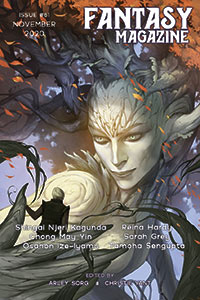Year-in-Review: 2023 Magazine Summary
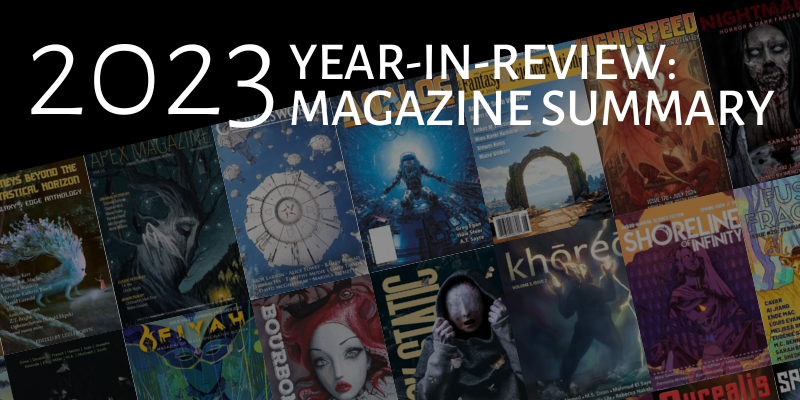
What a year! We saw some venues shifting to different formats, some away from print, while others hope to add it, and overall fewer new venues than in previous years. Magazines are still relying heavily on crowdfunding and reader support, and the expectation that fiction should be free to read is a tough obstacle to financial survival. Inflation and printer costs rose dramatically; Locus saw a 25% hike and one mag cited a 65% hike in printing costs. The end of Amazon subscriptions was a big blow for many, shifting only a portion of the magazines over to Kindle Unlimited, and even that significantly reduced revenue; some are citing a 50% drop. Despite all that, we still have a few new venues to be excited about, and many that continue to publish a spectrum of excellent fiction.
The Hugo Award category designation at the end of each description comes from either the publisher, <semiprozine.org>, or our best determination. Any of the editors or publishers named would generally also be eligible for Best Editor, Short Form, and the non-fiction magazines for Best Related Work.
Here the genre magazines are primarily sorted by Hugo Eligibility: Professional, Semiprozine, etc., and then loosely by pay rate, SFWA qualifying market, and the amount of fiction published. We covered 74 magazines, 24 audio sites, and 10 critical magazines.
In our charts we use the Statement of Ownership, required for use of a USPS Periodical Permit, plus numbers as provided, to get subscriber and newsstand sales for those who generate them, though this becomes less and less meaningful with digital numbers on the rise yet unreported. Print-plus-digital circulation figures for Locus comprise the subscription numbers; Asimov’s, Analog, and F&SF did not provide digital sales numbers. We use the sell-through number just for print (since there are no digital returns).
PROFESSIONAL MAGAZINES
 Analog, <www.analogsf.com>, had 7,745 print subscriptions, down from 8,436 last year and 8,901 the prior year. Due to the changes at Amazon, digital counts were unavailable this year, which will throw off our charts considerably. For reference, last year’s digital subscription count was 8,400 and digital plus print total was 16,836. Newsstand sales were 2,462, down from 3,352, and sell-through was 47%, down from last year’s 58%; neither figure includes digital so they were not affected by the change. Paid circulation on the other hand was down a whopping 49.4% due to the missing digital figures. The magazine is now available directly through <analogsf.com>.
Analog, <www.analogsf.com>, had 7,745 print subscriptions, down from 8,436 last year and 8,901 the prior year. Due to the changes at Amazon, digital counts were unavailable this year, which will throw off our charts considerably. For reference, last year’s digital subscription count was 8,400 and digital plus print total was 16,836. Newsstand sales were 2,462, down from 3,352, and sell-through was 47%, down from last year’s 58%; neither figure includes digital so they were not affected by the change. Paid circulation on the other hand was down a whopping 49.4% due to the missing digital figures. The magazine is now available directly through <analogsf.com>.
Analog produced six tall, digest-size double issues with 208 pages each. Cover price was $8.99. There were five novellas, 21 novelettes, and 69 short stories, for a total of 95 pieces of fiction, down from last year’s 102, plus seven “Science Fact” pieces, 12 poems, and other non-fiction. Covers were of good quality, including rainbowy reptilian aliens seated in a forest, a lit-up orbital platform with a “Hotel Vacancy” sign, and a man encountering a threatening elephant in the woods. Editor Trevor Quachri said, “2023 had its challenges for us, much like it did for other magazines and the economy as a whole. Costs for everything went up, but we weathered the storm by taking some digital fulfillment in-house, and we’re well-situated for the future. And now folks can buy digital issues directly from us, as well as all the usual places. We also got blasted by chatbot-generated submissions early in the year and in spite of a few brief windows, that hasn’t let up. It’s bad news for the people who have to weed those stories out (me) but good news for writers, who, based on what I’ve been seeing, should have absolutely NO worries about bots taking over creative fields. Otherwise, we’re looking forward to another great year of stories and to our mentoring sessions with the most recent Analog Award winner, Sakinah Hofler.” Analog paid 8-10 cents per word for short fiction, and 6 cents per word for serials. [Professional]
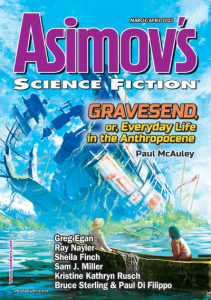 Asimov’s, <www.asimovs.com>, had 5,312 print subscriptions, down from 5,685 last year and 6,108 the prior year. As with Analog, digital numbers were not available, so our charts’ continuity is busted there also. Last year’s digital subscription count was 9,300 and digital plus print total was 14,985. Newsstand sales were 2,024, down from 2,722, and sell-through was at 36%, down from last year’s 49%; neither figure incorporates digital so they were not affected by the change. Total paid circulation was down 58.6% due to the missing digital figures but is not a cause for alarm; we hope to return to the usual counts next year. The digest is now available directly through <www.asimovs.com>.
Asimov’s, <www.asimovs.com>, had 5,312 print subscriptions, down from 5,685 last year and 6,108 the prior year. As with Analog, digital numbers were not available, so our charts’ continuity is busted there also. Last year’s digital subscription count was 9,300 and digital plus print total was 14,985. Newsstand sales were 2,024, down from 2,722, and sell-through was at 36%, down from last year’s 49%; neither figure incorporates digital so they were not affected by the change. Total paid circulation was down 58.6% due to the missing digital figures but is not a cause for alarm; we hope to return to the usual counts next year. The digest is now available directly through <www.asimovs.com>.
Asimov’s produced six tall, digest-size double issues with 208 pages each. There were 10 novellas, 22 novelettes, 34 short stories, for 66 pieces of fiction, down from 73 last year, plus 27 poems and some non-fiction. Cover price was $8.99. Nice quality covers included a young girl cuddling a fluffy alien companion, boaters rowing near a spaceship shipwreck, and a spiky space station. Editor Sheila Williams said, “The most exciting 2023 news at Asimov’s and Analog may be that we’re offering digital subscriptions to the magazines directly from our websites – asimovs.com and analogsf.com. We’ve been deluged by AI submissions. Of the 1149 December 2023 fiction submissions to Asimov’s, at least 294 were AI generated. Fortunately, Neil Clarke developed some tools that are helpful for weeding them out. We published exciting work by Sandra McDonald, Paul McAuley, Ray Nayler, Kristine Kathryn Rusch, Greg Egan, Sam J. Miller, Gregory Feeley, T.K. Rex, Karen Heuler, John Alfred Taylor, Karawynn Long, Dean Whitlock, James Patrick Kelly, Christopher Rowe, David Erik Nelson, Allen M. Steele, Dominica Phetteplace, Andy Dudak, Rick Wilber, and many more.” Asimov’s paid 8-10 cents per word for short stories up to 7,500 words, and 8 cents over 7,500. [Professional]
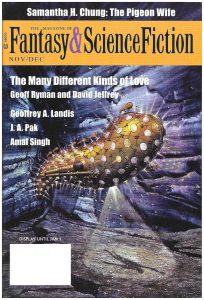 F&SF, <www.fandsf.com>, showed print subscription numbers of 4,791 in its Statement of Ownership, down a little from 4,945 the prior year, with 912 copies sold on newsstands, down from 962 last year, and sell-through of 33%. Paid circulation was down 3.5%, a little more than last year’s 2.7% drop. As always, without digital figures available it’s difficult to say how well the magazine did overall.
F&SF, <www.fandsf.com>, showed print subscription numbers of 4,791 in its Statement of Ownership, down a little from 4,945 the prior year, with 912 copies sold on newsstands, down from 962 last year, and sell-through of 33%. Paid circulation was down 3.5%, a little more than last year’s 2.7% drop. As always, without digital figures available it’s difficult to say how well the magazine did overall.
F&SF produced six digest-size double issues, each 258 pages: three novellas, 14 novelettes, and 68 short stories, for 85 pieces of fiction, up from 79 last year, plus 33 poems and some non-fiction. Cover price was $10.99. Cover art was of good quality, including a cellular-shaped undersea AI, a bespectacled cat communing with a small dragon, and a fantasy city with a giant moon. The publisher was Gordon Van Gelder, and the editor was Sheree Renée Thomas. Thomas said, “F&SF faced some unexpected challenges in 2023 but we are grateful to enter our 75th year in 2024. F&SF writers have earned some wonderful honors and accolades from their original short stories and poems. ‘The Different Kinds of Love’ by Geoff Ryman and David Jeffrey (Nov/Dec ’23) will appear in Allan Kaster’s The Year’s Best Hard Science Fiction Volume 8 this summer. Joe Baumann’s ‘There Won’t Be Questions’ (Jan/Feb ’22) was included as a Notable Story in Best American Short Stories. The ‘Voice of a Thousand Years’ by Fawaz Al-Matrouk and ‘Give Me English’ by Ai Jiang (May/June ’22) both appeared in Stephen Kotowych’s Year’s Best Canadian Fantasy & Science Fiction: Volume One (Dec ’23) and Al-Matrouk’s story also appeared in The Year’s Best Dark Fantasy & Horror, Vol. 4 edited by Paula Guran (Oct ’23). Jiang’s story was translated in both Chinese and Japanese and honored as a Locus finalist for Best Short Story. J.C. Hsyu’s novelette, ‘Optimist Cleaver’s Last Transmission’ appears in the inaugural issue of The Year’s Best Science Fiction on Earth (Nov ’23). We were honored to publish new works by beloved writers Eleanor Arnason, Celeste Rita Baker, Peter S. Beagle, Nina Kiriki Hoffman, Matthew Hughes, Geoffrey A. Landis, T.R. Napper, Marge Simon, and more, along with new works by M.H. Ayinde, Ferdison Cayetano, Lavie Tidhar, Tade Thompson…. Innovative writers to continue to watch include Samantha H. Chung, Max Firehammer, Getty Hesse, Kiran Kaur Saini, DeVaun Sanders, Fatima Taqvi, Gretchen Tessmer, and K.S. Walker to name just a few.” Pay rate was 8-12 cents a word. [Professional]
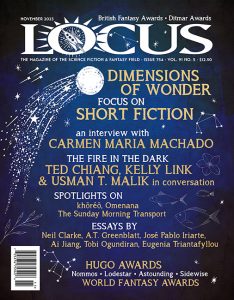 Locus, <locusmag.com>, shows paid circulation was up 2% in 2023, rebounding a bit from the hardship for bookstores during the pandemic but not back to 2021 levels yet. Sell-through was 57%, well up from 38% last year. Subscription numbers were down a tiny bit to 2,959, from 2,988 last year. As a 501(c)3 non-profit, Locus relies on donor support to survive, through Patreon, direct donations, and our annual fundraiser.
Locus, <locusmag.com>, shows paid circulation was up 2% in 2023, rebounding a bit from the hardship for bookstores during the pandemic but not back to 2021 levels yet. Sell-through was 57%, well up from 38% last year. Subscription numbers were down a tiny bit to 2,959, from 2,988 last year. As a 501(c)3 non-profit, Locus relies on donor support to survive, through Patreon, direct donations, and our annual fundraiser.
Twelve monthly issues in print and electronic formats included reviews, news, convention coverage, book listings, international reports, special features, interviews with new and established authors, and regular commentary from Cory Doctorow. The print cover price increased to $12.99 in January 2023, up from $8.99 (less for subscribers), while digital remained $5.99, with a monthly auto-renew option for $4.99 per issue.
We ran 701 reviews of SF, fantasy, horror, and YA fiction, up from 610 last year, including 350 short fiction. Our “Spotlight on” feature covered artists Eli Minaya, Winona Nelson, Eli John, Lauren Raye Snow, and Ed Binkley, author adrienne maree brown, The Best of World SF series, and the Portolan Project. November 2023 was a special issue, “Dimensions of Wonder: Focus on Short Fiction”, featuring interviews with Carmen Maria Machado and a roundtable on short fiction with Ted Chiang, Kelly Link, and Usman T. Malik, plus spotlights on publications khōréō, Omenana, and The Sunday Morning Transport, and essays on short fiction by Neil Clarke, A.T. Greenblatt, José Pablo Iriarte, Ai Jiang, Tobi Ogundiran, and Eugenia Triantafyllou.
Locus covered the SFWA Nebula Conference, the International Conference on the Fantastic in the Arts, Boskone, the Locus Awards, Readercon, WisCon, BayCon, Writers and Illustrators of the Future, Norwescon, StokerCon, and the Williamson Lectureship, World Fantasy, and Chengdu Worldcon plus other international cons Can*Con, ICon, Hal-Con, Pemmi-Con NASFiC, and the Science Fiction Research Association and Gesellschaft für Fantastikforschung’s joint annual conference in Germany, plus an article on Italian speculative fiction in translation, and a report on SF in India. We ran our first double issue this year, a combined December/January issue, in order to accommodate an unusual Worldcon/World Fantasy overlap plus Forthcoming Books issue and staff scheduling.
Liza Groen Trombi was editor-in-chief; Kirsten Gong-Wong was managing editor. Our website saw an average of 3.5 million non-bot sessions per month, up slightly from last year.. [Related Work/Professional]
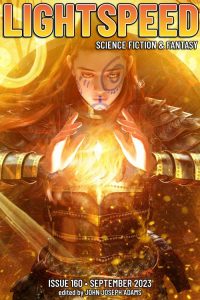 Tor.com published 29 originals -– 17 short stories and 12 novelettes –- plus one reprint from an academic journal, five reprints from their backlist, and five reprints from print anthologies; as well as artwork, commentary, non-fiction, and more, all web-based with some content available as ebooks and in newsletters. Short fiction coordinator Nancy Lambert said, “Tor.com celebrated its 15th anniversary in 2023, having published more than 600 short stories and garnering numerous awards and nominations since its launch in 2008. This [year] also marked Kaleb Russell’s debut as editor.” Noted stories included Ken Liu’s “The Passing of the Dragon”, Nghi Vo’s “On the Fox Roads”, Brian Evenson’s “After the Animal Flesh Beings”, Kemi Ashing-Giwa’s “The Puppetmaster”, Priya Sharma’s “Jack O’Dander”, C.L. Polk’s “Ivy, Angelica, Bay”, and Lyndsie Manusos’s “The Sound of Reindeer”. Tor.com pays $.25 a word for the first 5,000 words for fiction and reported three to four million page views a month. On January 9, 2024 they announced a rebrand, and relaunched as Reactor on January 23, with a new URL: <www.reactormag.com>. [Professional]
Tor.com published 29 originals -– 17 short stories and 12 novelettes –- plus one reprint from an academic journal, five reprints from their backlist, and five reprints from print anthologies; as well as artwork, commentary, non-fiction, and more, all web-based with some content available as ebooks and in newsletters. Short fiction coordinator Nancy Lambert said, “Tor.com celebrated its 15th anniversary in 2023, having published more than 600 short stories and garnering numerous awards and nominations since its launch in 2008. This [year] also marked Kaleb Russell’s debut as editor.” Noted stories included Ken Liu’s “The Passing of the Dragon”, Nghi Vo’s “On the Fox Roads”, Brian Evenson’s “After the Animal Flesh Beings”, Kemi Ashing-Giwa’s “The Puppetmaster”, Priya Sharma’s “Jack O’Dander”, C.L. Polk’s “Ivy, Angelica, Bay”, and Lyndsie Manusos’s “The Sound of Reindeer”. Tor.com pays $.25 a word for the first 5,000 words for fiction and reported three to four million page views a month. On January 9, 2024 they announced a rebrand, and relaunched as Reactor on January 23, with a new URL: <www.reactormag.com>. [Professional]
Lightspeed, <www.lightspeedmagazine.com>, Nightmare, and Fantasy are online and electronic, all published by Adamant Press. Lightspeed features roughly half science fiction and half fantasy. Edited by publisher John Joseph Adams, they produced 12 issues, online and electronic, with 46 short stories, 47 flash pieces, one novelette, and one reprint, plus interviews, podcasts, and more. Issues were free online, $3.99 for electronic, and $2.99 for subscribers. Pay was $.08/word. [Professional]
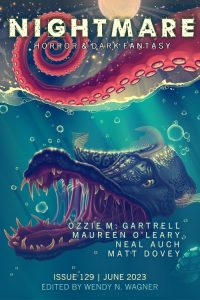 Nightmare, <www.nightmare-magazine.com>, edited by Wendy N. Wagner, published 12 monthly issues with 36 original horror and dark fantasy stories (24 shorts, 12 flash) plus eleven poems and non-fiction. Issues were free online, $3.99 for electronic, and $2.99 for subscribers. Pay was $.08/word. [Professional]
Nightmare, <www.nightmare-magazine.com>, edited by Wendy N. Wagner, published 12 monthly issues with 36 original horror and dark fantasy stories (24 shorts, 12 flash) plus eleven poems and non-fiction. Issues were free online, $3.99 for electronic, and $2.99 for subscribers. Pay was $.08/word. [Professional]
Fantasy, <www.nightmare-magazine.com>, co-edited by Christie Yant & Arley Sorg, published 10 monthly issues, and finishing their run with October as the final issue. Each month offered two original short stories, two original flash pieces, and two original poems, plus non-fiction. “Overall, we had a great run!” Sorg said, “including Eliza Chan’s British Fantasy finalist ‘The Tails That Make You’, Vida Cruz’s Ignyte winning essay ‘We Are The Mountain’, Eugen Bacon and Seb Doubinsky’s World Fantasy finalist ‘The Failing Name’, plus poetry nods, landing in Year’s Bests, and more. Christie and I were finalists twice for both World Fantasy and Locus Awards. I hope folks check out our final year, with wonderful work by Lowry Poletti (‘Dread Of The White Dog’), Ruoxi Chen (‘Fandom For Witches’), Simo Srinivas (‘Bozpo Witch-Bane’), and much more!” Issues were free online, $3.99 for electronic, and $2.99 for subscribers. Pay was $.08/word. [Professional]
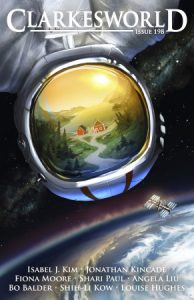 Clarkesworld, <clarkesworldmagazine.com>, published 12 online, electronic, and print issues, with 90 pieces of original fiction – all with podcast editions – and assorted non-fiction. Covers were high-quality original art. Publisher Neil Clarke said, “2023 was a year significantly complicated by a continuing wave of ‘AI’ submission spam and the shuttering of Amazon’s Kindle Periodicals Program…. We’re still trying to get a firm handle on our end of year digital subscription and readership data. There were unusual spikes throughout the year and integrating the different counting model used by the KU Magazine program hasn’t been as clear-cut as we hoped. Early data suggests that we may be down as many as five hundred digital subscriptions for the year, primarily due to the changes at Amazon, but we won’t have a firm number until our December data is in. Single issue sales of the digital edition ranged from 200-250/month. We have around 550 print subscribers and sell an additional 40-50 copies during the month of publication. We would love to see more stories by new and international authors.” Print cover price changed from $7.99 to $8.99 with the May 2023 issue; electronic issues increased in October from $2.99 to $3.99 with subscription. Clarkesworld pays $.12/word. [Professional]
Clarkesworld, <clarkesworldmagazine.com>, published 12 online, electronic, and print issues, with 90 pieces of original fiction – all with podcast editions – and assorted non-fiction. Covers were high-quality original art. Publisher Neil Clarke said, “2023 was a year significantly complicated by a continuing wave of ‘AI’ submission spam and the shuttering of Amazon’s Kindle Periodicals Program…. We’re still trying to get a firm handle on our end of year digital subscription and readership data. There were unusual spikes throughout the year and integrating the different counting model used by the KU Magazine program hasn’t been as clear-cut as we hoped. Early data suggests that we may be down as many as five hundred digital subscriptions for the year, primarily due to the changes at Amazon, but we won’t have a firm number until our December data is in. Single issue sales of the digital edition ranged from 200-250/month. We have around 550 print subscribers and sell an additional 40-50 copies during the month of publication. We would love to see more stories by new and international authors.” Print cover price changed from $7.99 to $8.99 with the May 2023 issue; electronic issues increased in October from $2.99 to $3.99 with subscription. Clarkesworld pays $.12/word. [Professional]
There were 12 issues of Forever, <forever-magazine.com>, Clarke’s “reprint only” project, with 44 reprint science fiction short stories, novellas, and novelettes. The magazine was available in digital formats for $2.99 per issue or by subscription. [Professional]
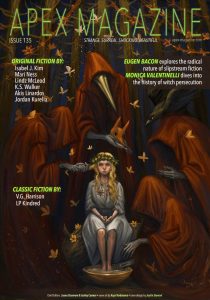 Apex, <www.apex-magazine.com>, produced seven digital issues with 54 original stories and 14 reprints. Lesley Conner was the editor-in-chief. Managing editor Rebecca Treasure said, “Stories that pushed boundaries and challenged society norms seemed to get the best response from our readers. Stories like “The Monster Fucker Club” by A.V. Greene and “Homewrecker” by E. Catherine Tobler. 2023 was a fantastic year for Apex Magazine. Overall, I feel as if the stories trended darker and closer to horror than they have in the past. Lots of big emotions!” There were 13,000 unique visitors/month with 30,000 hits/month and 1,200 subscribers, a little down from 1,500 last year but still well up from 800 the prior year; free online and in ebook for $4.99, less for subscribers. Pay rate was $.08/word. [Professional]
Apex, <www.apex-magazine.com>, produced seven digital issues with 54 original stories and 14 reprints. Lesley Conner was the editor-in-chief. Managing editor Rebecca Treasure said, “Stories that pushed boundaries and challenged society norms seemed to get the best response from our readers. Stories like “The Monster Fucker Club” by A.V. Greene and “Homewrecker” by E. Catherine Tobler. 2023 was a fantastic year for Apex Magazine. Overall, I feel as if the stories trended darker and closer to horror than they have in the past. Lots of big emotions!” There were 13,000 unique visitors/month with 30,000 hits/month and 1,200 subscribers, a little down from 1,500 last year but still well up from 800 the prior year; free online and in ebook for $4.99, less for subscribers. Pay rate was $.08/word. [Professional]
The Dark Magazine, <www.thedarkmagazine.com>, published 28 original “dark and strange” stories plus 20 reprints in 12 digital issues. Editor Sean Wallace said, “Three stories that most represented the magazine included ‘Sweat, Rice’ by Shari Paul; ‘If Someone You Love Has Become a Vurdalak’ by Sam J. Miller; and ‘Auscultation’ by J.S. Breukelaar. The mid-year loss of Amazon Newsstand was rather catastrophic, both in terms of revenue and subscribers. This has resulted in two major changes to the magazine: reverting back to the original two originals/two reprints approach that had originally been in place a few years back, along with instituting a small pay rate drop from six cents to five cents a word.” Issues were free online, $2.99 for ebook, $1.99 for subscribers. There were about 8,000 visits monthly.
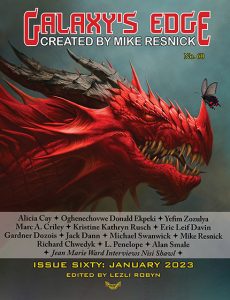 Galaxy’s Edge, <www.galaxysedge.com>, edited by Lezli Robyn and published by Shahid Mahmud, produced three print issues between 95-151 pages, 19 x 24.5 cm, perfect bound, with b&w interiors on book print and color matte covers, with 42 works of short fiction, including 34 originals, 7 standard reprints, and 1 reprint serial, plus non-fiction. These are the final three issues of the magazine. Robyn said, “Although I’m sad to see the magazine end, it’s only happening because we’re converting Galaxy’s Edge into an anthology series that will enable us to reach even more readers in brick-and-mortar bookstores. I’m happy and excited to see where this change takes us, and while I invite you all on this new journey with us, I also want to acknowledge the two most important people to have worked on this magazine: Shahid Mahmud and Mike Resnick. Without Shahid to fund and support this crazy venture, and Mike’s passion for helping new writers, this wonderful, decade-long market for authors would have never existed.” Fiction was free online, print cover price was $7.99, ebook $4.99. [Professional]
Galaxy’s Edge, <www.galaxysedge.com>, edited by Lezli Robyn and published by Shahid Mahmud, produced three print issues between 95-151 pages, 19 x 24.5 cm, perfect bound, with b&w interiors on book print and color matte covers, with 42 works of short fiction, including 34 originals, 7 standard reprints, and 1 reprint serial, plus non-fiction. These are the final three issues of the magazine. Robyn said, “Although I’m sad to see the magazine end, it’s only happening because we’re converting Galaxy’s Edge into an anthology series that will enable us to reach even more readers in brick-and-mortar bookstores. I’m happy and excited to see where this change takes us, and while I invite you all on this new journey with us, I also want to acknowledge the two most important people to have worked on this magazine: Shahid Mahmud and Mike Resnick. Without Shahid to fund and support this crazy venture, and Mike’s passion for helping new writers, this wonderful, decade-long market for authors would have never existed.” Fiction was free online, print cover price was $7.99, ebook $4.99. [Professional]
There were three perfect-bound, 17.5 x 25.5 cm issues of Pulphouse, <pulphousemagazine.com>, with glossy color covers and b&w interiors, 175-217 pages, with 30 short stories of which 13 were original. Editor was Dean Wesley Smith, with executive editor Kristine Kathryn Rusch. Publisher Allyson Longueira of WMG Publishing said, “We switched to a redesigned monthly format for Pulphouse this year, and that was our focus. We also ran a very successful Kickstarter this year for our Pulphouse subscription drive.” Cover price was $16.99/print, up from $12.99, and $6.99/ebook. Pay rate was $.06/word for original fiction, $100 flat fee for first-run reprints. [Professional]
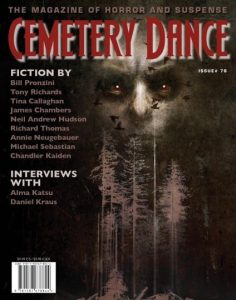 We saw one issue of Cemetery Dance, <www.cemeterydance.com>, saddle-stitched, 80 pages with a cover price of $9.99 and a glossy color cover, b&w interior with art, nine short stories, and some non-fiction. This is the first issue of the mag we have seen since 2019 when the magazine went on hiatus. Publisher was Richard Chizmar; general manager was Brian James Freeman. [Professional]
We saw one issue of Cemetery Dance, <www.cemeterydance.com>, saddle-stitched, 80 pages with a cover price of $9.99 and a glossy color cover, b&w interior with art, nine short stories, and some non-fiction. This is the first issue of the mag we have seen since 2019 when the magazine went on hiatus. Publisher was Richard Chizmar; general manager was Brian James Freeman. [Professional]
SEMIPROZINE
Our semiprozine fiction venues are loosely organized by pay rate and quantity of stories printed. SFWA qualifying status is $.08/word, so about the first portion of the semiprozines qualify.
Sunday Morning Transport, <sundaymorningtransport.com>, edited by Julian Yap & Fran Wilde, published 49 original stories and one reprint online and in weekly newsletter format via Substack. Wilde said, “2023 was filled with exceptional stories including several from debut authors – we have loved reading them all and are so grateful to the authors for sharing their stories with us.” Pay was $.25/word. Wilde reported nearly 3,500 subscribers (combined paid and free), roughly double from the prior year. [Semiprozine]
 Uncanny, <uncannymagazine.com>, published six issues, online and electronic, with 48 original stories – including one novella and ten novelettes – and three reprints; plus essays, poems, interviews, and podcasts. Lynne M. Thomas & Michael Damian Thomas were co-editors-in-chief. “We faced numerous challenges including the Editors’-in-Chief ongoing palliative care of their daughter, Caitlin, there were some staff changes, social media continued to fracture, and Uncanny Magazine was hit with the problem of Amazon closing the Kindle Periodical Program and forcing the magazine onto Kindle Unlimited with a 50% reduction of income. Uncanny Magazine won the 2023 Hugo Award for Best Semiprozine. ‘Rabbit Test’ by Samantha Mills won the Best Short Story Nebula, Locus, Sturgeon, and Hugo Awards. ‘If You Find Yourself Speaking to God, Address God with the Informal You’ by John Chu won the Best Novelette Nebula, Ignyte, and Locus Awards. ‘In Stock Images of the Future, Everything is White’ by Terese Mason Pierre won the Best Short Poem Rhysling Award. Editors-in-Chief Lynne M. Thomas and Michael Damian Thomas were finalists for World Fantasy and Locus Awards. Uncanny Magazine also successfully funded its tenth Kickstarter. Uncanny Magazine’s staff changed with Monte Lin taking over as the sole Managing Editor and Tania Chen taking over as Assistant Editor. Nonfiction Editor Meg Elison left to pursue other projects after Issue 50.” Issues were free online, $3.99 for electronic, and $1.99 for subscribers. Uncanny had 2,850 subscribers (before the end of KPP) and averaged 56,000 uniques. Pay was $.10/word for fiction. [Semiprozine]
Uncanny, <uncannymagazine.com>, published six issues, online and electronic, with 48 original stories – including one novella and ten novelettes – and three reprints; plus essays, poems, interviews, and podcasts. Lynne M. Thomas & Michael Damian Thomas were co-editors-in-chief. “We faced numerous challenges including the Editors’-in-Chief ongoing palliative care of their daughter, Caitlin, there were some staff changes, social media continued to fracture, and Uncanny Magazine was hit with the problem of Amazon closing the Kindle Periodical Program and forcing the magazine onto Kindle Unlimited with a 50% reduction of income. Uncanny Magazine won the 2023 Hugo Award for Best Semiprozine. ‘Rabbit Test’ by Samantha Mills won the Best Short Story Nebula, Locus, Sturgeon, and Hugo Awards. ‘If You Find Yourself Speaking to God, Address God with the Informal You’ by John Chu won the Best Novelette Nebula, Ignyte, and Locus Awards. ‘In Stock Images of the Future, Everything is White’ by Terese Mason Pierre won the Best Short Poem Rhysling Award. Editors-in-Chief Lynne M. Thomas and Michael Damian Thomas were finalists for World Fantasy and Locus Awards. Uncanny Magazine also successfully funded its tenth Kickstarter. Uncanny Magazine’s staff changed with Monte Lin taking over as the sole Managing Editor and Tania Chen taking over as Assistant Editor. Nonfiction Editor Meg Elison left to pursue other projects after Issue 50.” Issues were free online, $3.99 for electronic, and $1.99 for subscribers. Uncanny had 2,850 subscribers (before the end of KPP) and averaged 56,000 uniques. Pay was $.10/word for fiction. [Semiprozine]
Strange Horizons, <www.strangehorizons.com>, published weekly online issues plus a special fund-drive issue, with 41 original stories, plus poetry, reviews, and articles. Coordinating editor Gautam Bhatia said, “Eugenia Triantafyllou’s ‘Undog’ got a lot of attention on social media and from reviewers. More generally, we saw a lot of stories featuring the climate/biodiversity crises, both as prominent themes and as background realities in stories whose main focus was elsewhere. Another running motif in the stories we’ve published this year was personhood – how that is defined, by whom and for what reasons. We’d like to see more SFF that deals with religion and faith with nuance and sensitivity, and also more SFF from Indigenous voices.” Bhatia reported 331,000 users and 767,000 views. Pay rate was $.10/word for fiction. [Semiprozine]
Strange Horizons’s sister magazine Samovar, “a quarterly magazine of and about translated speculative fiction,” edited by Sarah Dodd, Laura Friis & Greg West, produced three online issues with five original stories and their accompanying translations, one reprint, and poetry. Pay rate for fiction was $.08/word to both author and translator, up to $300 each. [Semiprozie]
 Beneath Ceaseless Skies, <www.beneath-ceaseless-skies.com>, a biweekly “literary adventure fantasy” magazine published and edited by Scott H. Andrews, produced 25 online issues containing 37 short stories, 13 novelettes, and two novellas for a total 52 pieces of original fiction, plus 17 original podcast episodes, including their 15th-anniversary double-issue. Andrews said, “Accolades included a Hugo Award finalist for Scott for Best Editor Short Form (BCS recused from further nominations for the Best Semiprozine Hugo) and an Ignyte Award finalist for Best Fiction Podcast. Fiction singled out included ‘Interlude: Shelter From the Storm’ by Rajiv Moté, ‘The Light of Setting Suns’ by Samuel Chapman, and ‘Your Great Mother Across the Salt Sea’ by Kelsey Hutton. Highlights included stories by Carrie Vaughn, James Morrow, Kat Howard, Kel Coleman, Stephanie Malia Morris, and KJ Kabza. Funding remained a challenge. Less than 1% of the readership supported the magazine financially (donation, Patreon, ebook subscription). Supporters of the BCS Patreon enabled the magazine to maintain its 2019 increase in fiction pay rate and to pay its five first readers. Plans for 2024 include our seventh biannual Science-Fantasy Month, in February, featuring Natalia Theodoridou and Elly Bangs, and a 16th-anniversary double-issue featuring K.J. Parker.” The website averaged 70,000 uniques per month; podcasts averaged 7,500 downloads per episode. Pay rate was $.08/word. (Scott H. Andrews qualifies for the Best Editor Short Form Hugo but BCS recused itself from further Best Semiprozine nominations.) [Recused]
Beneath Ceaseless Skies, <www.beneath-ceaseless-skies.com>, a biweekly “literary adventure fantasy” magazine published and edited by Scott H. Andrews, produced 25 online issues containing 37 short stories, 13 novelettes, and two novellas for a total 52 pieces of original fiction, plus 17 original podcast episodes, including their 15th-anniversary double-issue. Andrews said, “Accolades included a Hugo Award finalist for Scott for Best Editor Short Form (BCS recused from further nominations for the Best Semiprozine Hugo) and an Ignyte Award finalist for Best Fiction Podcast. Fiction singled out included ‘Interlude: Shelter From the Storm’ by Rajiv Moté, ‘The Light of Setting Suns’ by Samuel Chapman, and ‘Your Great Mother Across the Salt Sea’ by Kelsey Hutton. Highlights included stories by Carrie Vaughn, James Morrow, Kat Howard, Kel Coleman, Stephanie Malia Morris, and KJ Kabza. Funding remained a challenge. Less than 1% of the readership supported the magazine financially (donation, Patreon, ebook subscription). Supporters of the BCS Patreon enabled the magazine to maintain its 2019 increase in fiction pay rate and to pay its five first readers. Plans for 2024 include our seventh biannual Science-Fantasy Month, in February, featuring Natalia Theodoridou and Elly Bangs, and a 16th-anniversary double-issue featuring K.J. Parker.” The website averaged 70,000 uniques per month; podcasts averaged 7,500 downloads per episode. Pay rate was $.08/word. (Scott H. Andrews qualifies for the Best Editor Short Form Hugo but BCS recused itself from further Best Semiprozine nominations.) [Recused]
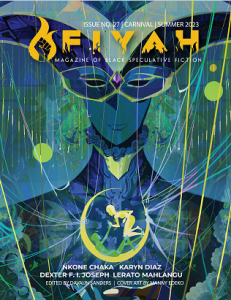 Fiyah, <www.fiyahlitmag.com>, the “Magazine of Black Speculative Fiction,” published four scheduled electronic issues, as well as hosting the Ignyte Awards. Fiyah was a 2023 Best Semiprozine Hugo Award finalist. Publisher and executive editor DaVaun Sanders said, “In 2023 I formally took over publishing duties for the magazine. There’s no shortage of trepidation and excitement for 2024 as the last of the OG/legacy staff responsible for the magazine’s next phase and continued footprint in SFF. One development I’m particularly excited for is bringing on more guest editors for this year, giving our stellar acquiring editors some invaluable experience. I never envisioned FIYAH’s stories being curated through one person’s editorial taste and intend to ensure FIYAH continues to reflect the multifaceted vision of Black creatives worldwide.” Pay was $.08/word for fiction, $50 for poetry. They had 389 magazine subscribers, over 2,000 digital issue purchases, 4,700 newsletter subscribers, and 2,648 unique visitors per month. [Semiprozine]
Fiyah, <www.fiyahlitmag.com>, the “Magazine of Black Speculative Fiction,” published four scheduled electronic issues, as well as hosting the Ignyte Awards. Fiyah was a 2023 Best Semiprozine Hugo Award finalist. Publisher and executive editor DaVaun Sanders said, “In 2023 I formally took over publishing duties for the magazine. There’s no shortage of trepidation and excitement for 2024 as the last of the OG/legacy staff responsible for the magazine’s next phase and continued footprint in SFF. One development I’m particularly excited for is bringing on more guest editors for this year, giving our stellar acquiring editors some invaluable experience. I never envisioned FIYAH’s stories being curated through one person’s editorial taste and intend to ensure FIYAH continues to reflect the multifaceted vision of Black creatives worldwide.” Pay was $.08/word for fiction, $50 for poetry. They had 389 magazine subscribers, over 2,000 digital issue purchases, 4,700 newsletter subscribers, and 2,648 unique visitors per month. [Semiprozine]
The Deadlands, <thedeadlands.com>, “an adventure into the unknown, to meet those who live there still, even though they may be dead,” published 22 original stories plus poetry and non-fiction in 12 online issues. Editor-in-chief E. Catherine Tobler said, “2023 was rough; we did not meet our funding goals and as such will be going to a quarterly publishing schedule in 2024 instead of monthly. But we will be adding a print edition, so trying to keep things fresh and fun. Amal Singh’s ‘Notes From a Pyre’ was a well-received detour into SF, which we have not seen much of in submissions. ‘The Dead Boy Inside Me’ by Angel Leal was a poem that touched many readers. ‘Jar,’ by Erin Brown delighted with its body horror. Our most-read 2023 story was ‘The Ferryman,’ by Fernanda Coutinho Teixeira.” 4,700 average unique visitors per month with 106 Patreon subscribers. Pay was $.10/word for fiction, $50/poem, $100/non-fiction. [Semiprozine]
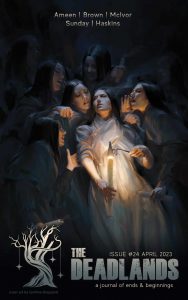 Diabolical Plots, <www.diabolicalplots.com>, edited by David Steffen, published 23 original stories in 12 monthly online issues. Steffen said, “We published our second themed issue: Diabolical Thoughts telepathy theme, guest edited by Ziv Wities. We welcomed two new assistant editors: Chelle Parker and Hal Y. Zhang, to join the established assistant editors Ziv Wities and Kel Coleman. The stories that got the best response are a pretty eclectic mix… the raw and visceral like: ‘Interstate Mohinis’ by M.L. Krishnan, ‘They Were Wonderful, Once’ by Lily Watson were ones that seemed to get special attention. ‘Re: Your Stone’ by Guan Un got a lot of laughs… ‘Bottled Words’ by Carol Scheina, people found very relatable for the family dynamic and emphasis on differing communication styles with those you love.” Pay was $.10/word, and there were around 1,530 subscribers via Patreon and newsletter. [Semiprozine]
Diabolical Plots, <www.diabolicalplots.com>, edited by David Steffen, published 23 original stories in 12 monthly online issues. Steffen said, “We published our second themed issue: Diabolical Thoughts telepathy theme, guest edited by Ziv Wities. We welcomed two new assistant editors: Chelle Parker and Hal Y. Zhang, to join the established assistant editors Ziv Wities and Kel Coleman. The stories that got the best response are a pretty eclectic mix… the raw and visceral like: ‘Interstate Mohinis’ by M.L. Krishnan, ‘They Were Wonderful, Once’ by Lily Watson were ones that seemed to get special attention. ‘Re: Your Stone’ by Guan Un got a lot of laughs… ‘Bottled Words’ by Carol Scheina, people found very relatable for the family dynamic and emphasis on differing communication styles with those you love.” Pay was $.10/word, and there were around 1,530 subscribers via Patreon and newsletter. [Semiprozine]
Lady Churchill’s Rosebud Wristlet, <smallbeerpress.com/lcrw>, produced one saddle-stitched, oversize chapbook, with b&w cover and interior, 60 pages, with 8 pieces of original short fiction and some non-fiction. Print and ebook subscriptions were just under 300 and 50 respectively. Co-editors were Gavin J. Grant & Kelly Link. Grant said, “I am quite limited due to Long COVID so I put LCRW aside this year while I worked on the Small Beer books. In 2024, as we only have one book, we should be back to the usual 2 issues per year.” Cover price was $6.00, $3.99/ebook. Pay rate was $.03/word, $25 minimum, and $10/poem. [Semiprozine]
Interzone and IZ Digital <interzone.press> are UK electronic-only genre publications. Editor Gareth Jelley says, “Interzone was founded in 1982 by David Pringle, John Clute, Alan Dorey, Malcolm Edwards, Colin Greenland, Graham Jones, Roz Kaveney, and Simon Ounsley. It was published by TTA Press and edited by Andy Cox from 2004 to 2022 and is now published by MYY Press and edited by Gareth Jelley. As of Interzone #296, Interzone is digital only (EPUB); no print edition will be produced…. Issues of Interzone will also be available from Scarlet Ferret and Weightless Books.” Three issues were published with 33 original short stories. Cover price was £7.00/ebook, less for subscribers. IZ Digital is Interzone’s free online sister ‘zine. There are no numbered issues. Stories, reviews, and interviews are published and can be read for free at <interzone.digital>. IZ Digital published 47 original stories in 2023, 42 with original commissioned art. MYY pay rate was €.015/word. [Semiprozine]
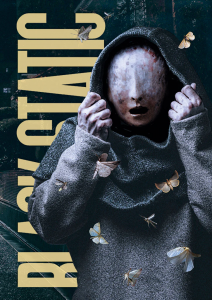 We saw the final issue of Black Static, <www.ttapress.com>, a well-known UK print and electronic juggernaut that published a great deal of fine horror fiction over its 30 years of publication. Veteran editor Andy Cox said, “Black Static began life as The Third Alternative of course, thirty years ago. Suddenly that starts to feel like a very long time.” [Semiprozine]
We saw the final issue of Black Static, <www.ttapress.com>, a well-known UK print and electronic juggernaut that published a great deal of fine horror fiction over its 30 years of publication. Veteran editor Andy Cox said, “Black Static began life as The Third Alternative of course, thirty years ago. Suddenly that starts to feel like a very long time.” [Semiprozine]
Abyss & Apex, <www.abyssapexzine.com>, published 26 original stories and two reprints, plus book reviews, editorials, and poems in four quarterly issues and, separately, a special holiday story. Editor and publisher Wendy S. Delmater said, “We don’t see enough science fiction. We get 10 to 15 fantasies per science fiction story submitted. That being said, the reader shift to preferring fantasy over science fiction continues. We love finding new talent. ‘The Price of Eggs’ by J.C. Pillard was a reader favorite, and ‘Birds of London’ by Beth Cato was a staff favorite. But the big favorite was ‘Night Sky in His Eyes’ by Bruo Lombardi: a Canadian author to watch.” Average unique visitors per month was 14,000. Pay was $.08/word to 1,000 awords, with a max of $80. [Semiprozine]
Augur, <www.augurmag.com>, an online lit-spec-fic magazine, published 20 original stories and 20 original poems and more in two issues. Terese Mason Pierre was co-editor-in-chief with Avi Silver. Sibling mag Tales & Feathers offered 21 “cozy slice-of-life fantasy” stories and poems in one issue edited by Anna Bendiy and Yilin Wang. Publisher Kerry C. Byrne said, “2023 was a great year for creative work with Augur, but a hard year for our team. Our staff struggles with burn out, and this year it hit critical mass, like many SFF publications. This is why some significant changes will come next year: We will be restructuring the team, number of issues, and pay for 2024. This year, we saw wonderful reception for some of our quieter, penetrating stories. Work that slowly reveals itself to you.” Byrne reported a total 2,666 visitors/month and 4,282 sessions/month. Pay was C$0.11/word for short fiction, C$110 flat for flash fiction up to 1,000 words, C$60 for poetry. [Semiprozine]
There were six regular and one special Halloween issues of Dark Matter, <darkmattermagazine.com>, offering a blend of science fiction and horror stories “that explore the shadow side of reality” with 60 original stories and seven reprints, assorted non-fiction, and extensive illustrations, available in print, audiobook, and free online. Print issues were 15 x 23 cm with matte color covers and color interiors on uncoated stock, 134-154 pages, featuring vibrantly colored pop art from robots to skeletal hordes. Editor-in-chief Rob Carroll said, “Dark Matter magazine ended its three-year run (2021-2023) with Issue 018 (November-December 2023). But this isn’t the end for Dark Matter, just a new direction…. Dark Matter will pivot away from the magazine in 2024 and toward our trade imprint (Dark Matter INK) and audio division (Dark Matter Audiolab), which we’ve been growing since 2022.” $15.00/print. Pay was $0.08/word for original fiction, $0.02 reprint. [Semiprozine]
Mysterion, <www.mysteriononline.com>, edited and published by Donald S. Crankshaw & Kristin Janz, published 12 original and two reprint stories in blog format. “Short, humorous stories are often reader favorites. We’d love to see more stories by authors in Africa, Asia, and Latin America; plus more far-future science fiction.” Pay was $.08/word for originals, $.04/word for reprints, with 630 average unique visitors per month and 1,680 hits per month. [Semiprozine]
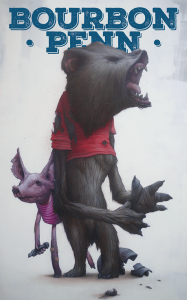 Bourbon Penn produced three perfect-bound issues, 12.75 x 20 cm, 139-165 pages, with color, glossy covers and b&w interiors, with 21 original stories, also available in ebook and for free at <www.bourbonpenn.com>. Covers were excellent quality, in the “cute and creepy” range with adorable but menacing critters including a wolfish birthday boy, a fanciful slow loris examining a brain, and a horror-style Pooh and Piglet with a broken “hunny” pot. Editor Erik Secker said, “2023 was a good year with website traffic increasing 6%, and both print sales and subscriptions increasing about 25% (digital sales were down from last year). We’re very excited about 2024. In addition to having new fiction by Brian Evenson and Alex Jennings, we’ve raised our standard payment rate to 4¢ a word for fiction!” Print cover price was $14.95; ebook $2.99. Pay rate was $.04/word, up from $.03. [Semiprozine]
Bourbon Penn produced three perfect-bound issues, 12.75 x 20 cm, 139-165 pages, with color, glossy covers and b&w interiors, with 21 original stories, also available in ebook and for free at <www.bourbonpenn.com>. Covers were excellent quality, in the “cute and creepy” range with adorable but menacing critters including a wolfish birthday boy, a fanciful slow loris examining a brain, and a horror-style Pooh and Piglet with a broken “hunny” pot. Editor Erik Secker said, “2023 was a good year with website traffic increasing 6%, and both print sales and subscriptions increasing about 25% (digital sales were down from last year). We’re very excited about 2024. In addition to having new fiction by Brian Evenson and Alex Jennings, we’ve raised our standard payment rate to 4¢ a word for fiction!” Print cover price was $14.95; ebook $2.99. Pay rate was $.04/word, up from $.03. [Semiprozine]
There was one “Cosmic Horror” themed issue of Weird Tales <www.weirdtales.com> the reboot, edited by Jonathan Maberry and published by John Harlacher, 96 pages, with 10 pieces of short horror and weird fiction and some non-fiction. Harlacher said, “Our 100th anniversary issue ballooned into a book called Weird Tales: 100 years of Weird.” Cover price was $14.00/print. Pay rate was $.10/word for fiction, $50 per poem. [Semiprozine]
There were two print issues of DreamForge Magazine, <dreamforgemagazine.com>, also electronically as four quarterly issues of DreamForge Anvil, <dreamforge.mywebportal.app>, with 22 original and three reprint stories, and three poems. All stories were also made available free online through a reader portal. Publisher and editor Scot Noel said, “In 2024, we’re celebrating our 5th year of publication with an extra-large print issue in mid-year themed “The Grand Uplift” and featuring stories of humans overcoming challenges and thriving in a grand future. We’re always looking for stories where the Human Adventure is just Beginning. Our main support for DreamForge comes from Kickstarter with 166 backers in 2023 and Patreon with 49 supporters. A goal of 2024 is to transfer our readers portal to a WordPress format and integrate it with Google Analytics. Our print numbers are under 200, including what we mail out directly and individual purchases from Amazon.” Print issue price was $14.99-$16.25 through Amazon, digital subscription was $17.99/for one year access to all online & digital back issues, or $3.25/ebook, up from $2.99. Pay rate was $.08/word for new fiction, up from $.07. [Semiprozine]
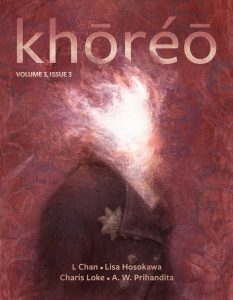 khōréō, <www.khoreomag.com>, published by Aleksandra “Ola” Hill and editors Kanika Agrawal and Zhui Ning Chang, is “a quarterly magazine of speculative fiction and migration.” They published 20 original stories in four online, free-to-read issues. Pay was $.10/word for fiction. [Semiprozine]
khōréō, <www.khoreomag.com>, published by Aleksandra “Ola” Hill and editors Kanika Agrawal and Zhui Ning Chang, is “a quarterly magazine of speculative fiction and migration.” They published 20 original stories in four online, free-to-read issues. Pay was $.10/word for fiction. [Semiprozine]
Frozen Wavelets, <frozenwavelets.com>, “offspring of The Earthian Hivemind,” a dark fiction periodical edited by Steph P. Bianchini, published 2 flash pieces plus one reprint stories and eleven poems in one issue. Pay was $.08/word for fiction, $1/line for poetry.
We saw four issues of On Spec, <onspec.ca>, a Canadian print and electronic digest, 130-165 pages, perfect bound, with 37 original short stories, 15 poems, and assorted non-fiction. Semi-gloss covers ranged from a surreal Dalí-esque room with a woman and goblet to an ocean floor with a steampunk bot. Diane L. Walton was managing editor and The Copper Pig Writers’ Society was publisher. Walton said, “We have experienced an uptick in digital sales and subscriptions, and are also making new sales on the Ko-fi platform. Significantly more work has been received over last year, so next year we may need to shorten the submission period, even to two weeks, to take pressure off the editorial staff. There is also the new risk of getting AI-generated stories that get past our sniff test, but each author needs to register on our site before they may submit. We editors would like to see more character-driven “hard” SF in future, perhaps with a mix of alien characters.” Print run per issue was 500, with a subscriber base stable at around 300, available in PDF, mobi, and epub from Weightless. Print cover price was C$6.95, less for subscribers; ebook increased from USD $2.99 to $4.99 with the year’s final issue. Pay rate was C$.05 and $100 per poem. [Semiprozine]
Cosmic Roots and Eldritch Shores, <cosmicrootsandeldritchshores.com>, edited by Fran Eisemann, published “about a dozen” stories. “It was a hectic year for the magazine, getting our Ukraine benefit anthology out, and for the world it was obviously not a good year. Humorous as well as serious but not despairing stories did well. We’d like to see more hard science fiction submissions!” Nearly 5,000 uniques/month, about 260 subscribers, and pay was $.08/word for original fiction, $.02/word for reprints. [Semiprozine]
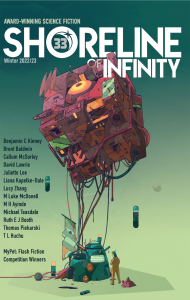 Shoreline of Infinity, <www.shorelineofinfinity.com>, based out of Scotland, published 37 stories plus poetry in three print and electronic issues, 125-142 pages. Editor-in-chief Noel Chidwick said, “The highlight was Issue 36, funded purely by Kickstarter. This was guest edited by Lyndsey Croal and was a special, themed on Climate Change. #35 was a tester for a new project – SF Caledonia – that will be expanded in 2024, in time for Worldcon in Glasgow, Scotland. SF Caledonia is a showcase for Scottish science fiction, fantasy and speculative fiction both past and present, focussing on the works of Scottish writers, no matter where in the world they might be. Full details at <sfcaledonia.scot>.” Print run was 260, with 100 subscribers and 140 digital sales/issue, up from 120. Print price was £7.95, digital/£3.45-£3.95, with around 3,100 unique website visitors monthly. Pay rate was around $.03/word, down from $.05. [Semiprozine]
Shoreline of Infinity, <www.shorelineofinfinity.com>, based out of Scotland, published 37 stories plus poetry in three print and electronic issues, 125-142 pages. Editor-in-chief Noel Chidwick said, “The highlight was Issue 36, funded purely by Kickstarter. This was guest edited by Lyndsey Croal and was a special, themed on Climate Change. #35 was a tester for a new project – SF Caledonia – that will be expanded in 2024, in time for Worldcon in Glasgow, Scotland. SF Caledonia is a showcase for Scottish science fiction, fantasy and speculative fiction both past and present, focussing on the works of Scottish writers, no matter where in the world they might be. Full details at <sfcaledonia.scot>.” Print run was 260, with 100 subscribers and 140 digital sales/issue, up from 120. Print price was £7.95, digital/£3.45-£3.95, with around 3,100 unique website visitors monthly. Pay rate was around $.03/word, down from $.05. [Semiprozine]
Grimdark, <grimdarkmagazine.com>, published four issues with 24 stories – 12 original and 12 reprints – focusing on “the grittier nature of people in futuristic or fantasy settings.” Founder and editor-in-chief Adrian Collins said, “T.R. Napper’s novella, ‘A Marked Man’, was a huge success, as was ‘The Royal Game’ by Christopher Ruocchio. I would like to see more independent and BIPOC authors in future issues. In 2024, we plan on some interesting issues, such as one dedicated to authors and stories from South Asia and one from Australian authors. We will also do our annual science fiction issue, focusing on the darker side of the genre.” Collins reported 1.5 million hits for 2023, with 200 subscribers. Pay was A$.07/word for original fiction, A$.01 for reprints. [Semiprozine]
Apparition Lit, <apparitionlit.com>, “strange, misshapen stories with enough emotional heft to break a heart, with prose that’s as clear and delicious as broth,” online and digital literary spec-fic magazine by owners/senior editors Rebecca Bennett, Clarke Doty, Amy Henry Robinson & Tacoma Tomilson. They published 16 original stories in four issues, plus 12 flash pieces for monthly contests. “In 2023 we created Print-On-Demand versions of all our past issues on Amazon. We got great reception to our horror stories this year. It’s rare for us to receive horror so it was gratifying to see people enjoy our interpretation of the genre.” 109 subscribers with 192 POD orders; pay was $.05/word for fiction, $50/poem and flash. [Semiprozine]
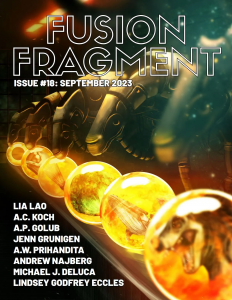 Fusion Fragment, <fusionfragment.com> produced five regular “science fiction or SF-tinged literary fiction” issues available electronically and in print as full-sized, perfect bound editions with semi-gloss color covers and color interiors on coated stock, 101-129 pages, with 10 novelettes and 25 short stories, 33 of which were originals. Editor Cavan Terrill said, “We increased pay rates slightly last year and continued to add first readers throughout 2023 and ended the year with a pretty large crew of 18 readers (including myself) who are really in tune with the FF vision. In 2024, we’ll move from having five issues (usually of eight stories each) per year to four issues per year containing ten stories each. Our print editions are extremely expensive and the production cost has increased steadily, so we might move to a more traditional trade paperback format. I was really astonished by the quality of the novelettes I got to publish this year, and I’ll specifically call out Dana Floberg’s “The Maskmaker”, which is the best debut story I’ve ever read. Overall, revenue increased about 20% from $1017 to $1215. So, the story is much the same as last year – steady growth, but on small numbers, and revenue still only accounts for about 10% of my yearly production budget.” Total digital downloads were at 805, plus Patreon subscribers and fifteen print copies sold. Pay rate increased to C$0.04/word up to C$400 maximum, up from C$0.035/word up to C$300 maximum. [Semiprozine]
Fusion Fragment, <fusionfragment.com> produced five regular “science fiction or SF-tinged literary fiction” issues available electronically and in print as full-sized, perfect bound editions with semi-gloss color covers and color interiors on coated stock, 101-129 pages, with 10 novelettes and 25 short stories, 33 of which were originals. Editor Cavan Terrill said, “We increased pay rates slightly last year and continued to add first readers throughout 2023 and ended the year with a pretty large crew of 18 readers (including myself) who are really in tune with the FF vision. In 2024, we’ll move from having five issues (usually of eight stories each) per year to four issues per year containing ten stories each. Our print editions are extremely expensive and the production cost has increased steadily, so we might move to a more traditional trade paperback format. I was really astonished by the quality of the novelettes I got to publish this year, and I’ll specifically call out Dana Floberg’s “The Maskmaker”, which is the best debut story I’ve ever read. Overall, revenue increased about 20% from $1017 to $1215. So, the story is much the same as last year – steady growth, but on small numbers, and revenue still only accounts for about 10% of my yearly production budget.” Total digital downloads were at 805, plus Patreon subscribers and fifteen print copies sold. Pay rate increased to C$0.04/word up to C$400 maximum, up from C$0.035/word up to C$300 maximum. [Semiprozine]
We saw four issues of Pulp Literature, <pulpliterature.com>, available in print and electronically, with 39 original stories and six reprints, and some non-fiction. Print was digest size, perfect bound with glossy color covers and b&w interior. Managing editor Jennifer Landels said, “We’re always on the lookout for humour and hard SF (not necessarily in the same story). We were delighted to publish two stories by Finnian Burnett in 2023, and our Winter 2024 has a story by them that Rob Sawyer calls ‘A gut-punch. Terrific.’ Melanie Marttila is also a writer to watch. Printing costs increased by 65% in the last quarter of 2023, therefore subscription & single copy rates are increasing in 2024.” Digital subscriptions were around 300, with individual digital sales of 50/issue. For print there were an average of 160 copies sold per issue, up from 120. Pay rates were $0.02 to $0.08/word. Price was C$14.99 print, C$4.99 electronic. [Semiprozine]
 Space and Time, <spaceandtime.net>, produced two regular and one special “AI Discovery” issues with 19 original short stories and one reprint, plus poetry and assorted non-fiction. Angela Yuriko Smith & Ryan Aussie Smith were co-publishers and Angela Yuriko Smith was editor-in-chief. Yuriko Smith said, “I took over the magazine in late 2019 and I feel like I’ve been hanging on for dear life since with all the changes. Between postage and paper increases, the AI situation, COVID, an international move in December 2022… I’m in disbelief that we are still here…. One of the upcoming plans will be the Linzner Awards, in tribute to Gordon Linzner who established the magazine in 1966 on a mimeograph machine while he was still in high school. The awards will be voted on by our readers and will include categories for excellence in fiction, nonfiction, poetry, editing, visual art and so on. This will be taking place on November 3rd as the final event in LaikaCon, a virtual convention from Space and Time to promote and celebrate the speculative genre. I plan to run a Kickstarter in September. Among other plans, we hope to raise our payments for all our content and add English to Portuguese translations and distribution in Brazil by 2025.” There were 118 individual print copies and 106 digital copies sold. Cover price was $12.00/print and $3.99 digital, up from $10.00/print and $2.99 digital. Pay rate was $.01/word. [Semiprozine]
Space and Time, <spaceandtime.net>, produced two regular and one special “AI Discovery” issues with 19 original short stories and one reprint, plus poetry and assorted non-fiction. Angela Yuriko Smith & Ryan Aussie Smith were co-publishers and Angela Yuriko Smith was editor-in-chief. Yuriko Smith said, “I took over the magazine in late 2019 and I feel like I’ve been hanging on for dear life since with all the changes. Between postage and paper increases, the AI situation, COVID, an international move in December 2022… I’m in disbelief that we are still here…. One of the upcoming plans will be the Linzner Awards, in tribute to Gordon Linzner who established the magazine in 1966 on a mimeograph machine while he was still in high school. The awards will be voted on by our readers and will include categories for excellence in fiction, nonfiction, poetry, editing, visual art and so on. This will be taking place on November 3rd as the final event in LaikaCon, a virtual convention from Space and Time to promote and celebrate the speculative genre. I plan to run a Kickstarter in September. Among other plans, we hope to raise our payments for all our content and add English to Portuguese translations and distribution in Brazil by 2025.” There were 118 individual print copies and 106 digital copies sold. Cover price was $12.00/print and $3.99 digital, up from $10.00/print and $2.99 digital. Pay rate was $.01/word. [Semiprozine]
We saw three issues of Heartlines Spec, <heartlines-spec.com>, launched this year, a Canadian print and electronic “speculative magazine focused on long-term friendships and relationships” with 22 short stories and 14 poems, 15.25 x 23 cm, perfect bound with glossy color covers and b&w interior, 81-90 pages. Managing editor Rebecca Bennett said, “Some of our favourite pieces have their own measure of hope, it’s the fear of loss that keeps the throughline in each. We were lucky enough to publish works by Sarah Ramdawar, Manuela Amiouny and Angel Leal.” There were 164 total subscribers, 33% of which were paid subscribers, with 34 POD print copies sold. They accept works from international writers but aim for a percentage of Canadian content. Pay rate was C$0.01/word for fiction, C$60/poem. Price was $12.99 print, $5.99 electronic. [Semiprozine]
There were four issues of Wyldblood, <wyldblood.com/magazine>, a UK-based magazine of “cutting edge fantasy and science fiction,” available in print and electronically, with 41 stories and 44 flash stories (digital only) on the website. Print was 17.78 x 25.4 cm, perfect bound, with glossy color covers and b&w interior, 83-90 pages. Editor Mark Bilsborough said, “Thoughtful fantasy gets the best response with us – hard sci-fi and epic fantasy less so. Liam Hogan, Holly Cornetto and Michael Teasdale (amongst others) gave us standout stories this year.” Pay rates were £0.01/word, £100 flat rate for novellas. Price was £7.50 print, £3-£4 electronic. [Semiprozine] GigaNotoSaurus, <giganotosaurus.org>, edited by LaShawn M. Wanak, published 12 fantasy or SF pieces online. “Our most viewed published story for 2023 was ‘On the English Approach to History’ by E. Saxey, followed up by ‘Ghosting’ by Kelly Lagor and ‘Her Suffering, Pretty and Private’ by Aimee Ogden. All our stories are wonderful, but my favorite was ‘Reconciliation Dumplings and Other Recipes’ by Sara Norja mainly because you can make the recipes listed in the story.” They averaged 2,833 visits/month, with 1,400 uniques, and 661 ebook downloads. Pay rate was $200/story. [Semiprozine]
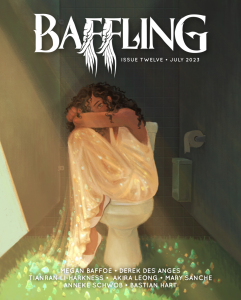 Baffling, <bafflingmag.com>, published 29 flash stories in four online issues, plus a print anthology of the year’s content. Published by Neon Hemlock, the magazine is co-edited by Kel Coleman & dave ring, who said, “Baffling is now in our fourth year, and we’ve had both growing pains and successes…. Our most-read stories this past year were ‘The Little Free Guide To Dronewatching, Abridged & Annotated’ by Ann LeBlanc, ‘How to Stay Married to Baba Yaga’ by S.M. Hallow, and ‘Advice for Aspiring Cartographers’ by Avra Margariti. We have just under forty patrons that keep us afloat and allow us to pay pro-rates.” They see ~20,000 visitors/year, with ~15,000/year uniques. Pay was $.08/word. [Semiprozine]
Baffling, <bafflingmag.com>, published 29 flash stories in four online issues, plus a print anthology of the year’s content. Published by Neon Hemlock, the magazine is co-edited by Kel Coleman & dave ring, who said, “Baffling is now in our fourth year, and we’ve had both growing pains and successes…. Our most-read stories this past year were ‘The Little Free Guide To Dronewatching, Abridged & Annotated’ by Ann LeBlanc, ‘How to Stay Married to Baba Yaga’ by S.M. Hallow, and ‘Advice for Aspiring Cartographers’ by Avra Margariti. We have just under forty patrons that keep us afloat and allow us to pay pro-rates.” They see ~20,000 visitors/year, with ~15,000/year uniques. Pay was $.08/word. [Semiprozine]
Monthly Flash Fiction Online, <flashfictiononline.com>, edited by Rebecca Halsey, et al, posted 12 scheduled issues with 47 flash fiction pieces – 33 original and 14 reprints. Halsey said, “Flash Fiction Online underwent some reorganization after our Editor-in-Chief and Publisher stepped down to focus on family and personal health, but our core mission has remained the same throughout – find and publish brief and beautiful fiction. Our biggest goal in 2024 is an administrative one – to re-incorporate under the financial purview of a literary nonprofit. Creatively, I think we did a great job expanding our ‘speculative literary style’ to be more inclusive of fresh voices, but I think we can go further. My other big goal for 2024 is to recruit some guest editors.” Pay was $80 for original flash, $20 for reprints. “Due to an increase in donations, 2024 rate will be $100 for each original story and $36 for reprints.” They had ~10,000 visitors and ~20,000 hits per month, with 86 subscribers and 253 digital issues sold. [Semiprozine]
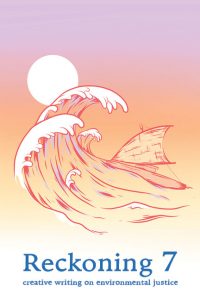 Reckoning, <reckoning.press>, “a nonprofit, annual journal of creative writing on environmental justice,” published one issue with 14 original stories plus 17 poems and some essays, 15 x 23 cm perfect bound with semi-gloss color cover, 255 pages, available in print and electronic editions and free online. Publisher Michael J. DeLuca said “Positive, uplifting stories in which people work hard to better their lives and their communities were the clear winners with our readers, and we sure would like to keep publishing more of that – though there is a fine line to walk vis-à-vis how much positivity is too much.” There were 48 ebook subscribers via Weightless and Patreon, 17 print Patreon subscribers, 60 individual ebook sales through Weightless, Kindle, and IngramSpark, and 170 print sales. Average unique visitors per month was up to 19,000 from 2,000, with 156,000 hits per month, well up from last year, with some of the boost likely accounted for by a switch from Google Analytics to GreenGeeks for tracking. Pay was $0.10/word for fiction, $50/page for poetry, up from $30. Print cover price was $20.00, $7.00/ebook. [Semiprozine]
Reckoning, <reckoning.press>, “a nonprofit, annual journal of creative writing on environmental justice,” published one issue with 14 original stories plus 17 poems and some essays, 15 x 23 cm perfect bound with semi-gloss color cover, 255 pages, available in print and electronic editions and free online. Publisher Michael J. DeLuca said “Positive, uplifting stories in which people work hard to better their lives and their communities were the clear winners with our readers, and we sure would like to keep publishing more of that – though there is a fine line to walk vis-à-vis how much positivity is too much.” There were 48 ebook subscribers via Weightless and Patreon, 17 print Patreon subscribers, 60 individual ebook sales through Weightless, Kindle, and IngramSpark, and 170 print sales. Average unique visitors per month was up to 19,000 from 2,000, with 156,000 hits per month, well up from last year, with some of the boost likely accounted for by a switch from Google Analytics to GreenGeeks for tracking. Pay was $0.10/word for fiction, $50/page for poetry, up from $30. Print cover price was $20.00, $7.00/ebook. [Semiprozine]
James Gunn’s Ad Astra, <www.adastrasf.com>, “the best parts of creative magazines and scholarly journals,” published two issues with 11 stories and three poems. Editor-in-chief Jean Asselin said, “We plan to get our publication to three issues per year in 2024, the next one being now readied for the next Spring equinox… our ultimate aim is to publish quarterly. We are still hoping to add print-on-demand at some point, which many of our authors and readers would appreciate.” Pay was $50/story. [Semiprozine]
New Myths, <newmyths.com>, published 33 original stories plus poems and non-fiction in four online issues. They also published annual “best of” Cosmic Muse, which incorporates some reprints from the magazine and some original work. Susan Shell Winston was editor, with editor and publisher Scott T. Barnes. Pay was 3 cents/word, minimum of $50. They had ~10,000 hits per quarter, with 750 “readers who spend more than 20 minutes browsing each quarterly issue” and 1,500+ shorter visits. [Semiprozine]
Bards and Sages Quarterly, <www.bardsandsages.com>, published by Julie Ann Dawson, published 35 stories – 27 original and eight reprints – in four online issues. Pay was a flat $30 up to 5,000 words and $50 up to 20,000 words for original fiction, $20 for reprints. [Semiprozine]
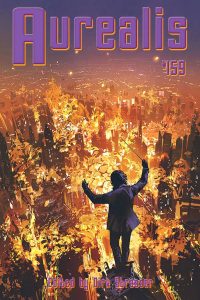 Australian Aurealis, <aurealis.com.au>, published 40 original stories in ten online issues. Editor Dirk Strasser said, “We always get a good response to humourous stories so I guess we would like to see more of them. The only unexpected trend was a distinct rise in what are obviously AI assisted stories. We would like to see far less of these.” Pay rate was A$.02/word. Parent company Chimaera Publications also ran the Aurealis Awards. [Semiprozine]
Australian Aurealis, <aurealis.com.au>, published 40 original stories in ten online issues. Editor Dirk Strasser said, “We always get a good response to humourous stories so I guess we would like to see more of them. The only unexpected trend was a distinct rise in what are obviously AI assisted stories. We would like to see far less of these.” Pay rate was A$.02/word. Parent company Chimaera Publications also ran the Aurealis Awards. [Semiprozine]
Australian Andromeda Spaceways, <andromedaspaceways.com>, run by Tom Dullemond, Shelly Nir, Samantha Ryder, and Joel Shanke, published four online issues with 37 original stories plus poems. “We’re happy with the community responses so we try not to obsess over statistics.” Pay for short fiction was A$.01/word up to 10,000 words and A$10 for poetry. [Semiprozine]
Kaleidotrope, <www.kaleidotrope.net>, a quarterly, published 48 original stories in four online issues plus poetry. Editor Fred Coppersmith said, “It was a relatively good year for Kaleidotrope…. I’m still trying to rebuild reader engagement in other places, like Bluesky and Mastodon, and I’m continuing to publish a free weekly newsletter in addition to the zine itself. Some of the stories that got the best (or at least most) response this year were ‘Crawling Back to You’ by H. Pueyo (Winter 2023), ‘The Number of the Ghosts’ by M. Bennardo (Spring 2023), ‘Disparate Points in Space and Time’ by Maxine Sophia Wolff (Summer 2023), and ‘Black Tea, Cream Tea, Chocolate Tea, Blood’ by Elou Carroll (Autumn 2023).” Pay was $.01/word, $5 for poetry, $60 for artwork. [Semiprozine]
Heroic Fantasy Quarterly, <www.heroicfantasyquarterly.com>, published 12 short stories, including one reprint, plus poetry and comics in four online issues. Editor Adrian Simmons said, “We had record numbers of submissions in August of 2023 and we had to bring on two new sub-editors – we are now a team of five…. The sword and sorcery sub-genre has grown quite a bit over the last few years.” Simmons reported between 3,000 – 5,000 uniques per month, plus 15 Patreon supporters and 56 contributors to the “Best Of” print Kickstarter. Pay was up to $100 for fiction, $25-50 for poems, with variation based on length. [Semiprozine]
The Future Fire, <futurefire.net>, a quarterly magazine of progressive, feminist, queer, eco, multicultural, and cyberpunk fiction published four issues with 18 stories (including three reprints and a novelette) and 12 poems. Editor Djibril al-Ayad said, “In some ways 2023 ran on autopilot, inasmuch as our usual community engagement through social media almost entirely collapsed (FB engagement plummeted for reasons that are opaque to me; Twitter, well, isn’t news). Submissions were very good, but presumably almost all came through Duotrope and Grinder. We did appoint a new member of the editorial team, the amazing M.L. Clark, and we’re looking to be more proactive and engaged in 2024. Watch this space!” Pay was $20 for fiction. [Semiprozine]
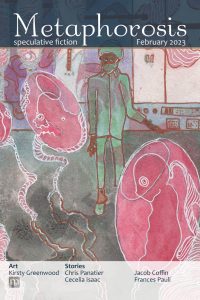 Metaphorosis, <magazine.metaphorosis.com>, a monthly print and digital venue for “intelligent, beautifully written stories for adults” published 12 issues with 45 short stories, one novelette, and one novella, all original. Print issues were an unusual miniature-format 10 x 15 cm with glossy color covers and good-quality art. Editor B. Morris Allen said, “In 2024, we’ll make some substantial shifts to celebrate our 97-100th issues: one story/month instead of one/week, and all solicited stories instead of all unsolicited.” There was an average of 2,000 visitors/month. Stories were available free on the website or $12.00/print on Amazon, $4.00/ebook. Pay was $0.01/word. [Semiprozine]
Metaphorosis, <magazine.metaphorosis.com>, a monthly print and digital venue for “intelligent, beautifully written stories for adults” published 12 issues with 45 short stories, one novelette, and one novella, all original. Print issues were an unusual miniature-format 10 x 15 cm with glossy color covers and good-quality art. Editor B. Morris Allen said, “In 2024, we’ll make some substantial shifts to celebrate our 97-100th issues: one story/month instead of one/week, and all solicited stories instead of all unsolicited.” There was an average of 2,000 visitors/month. Stories were available free on the website or $12.00/print on Amazon, $4.00/ebook. Pay was $0.01/word. [Semiprozine]
Omenana, <omenana.com>, speculative fiction “from Africa and the African Diaspora,” published 20 original stories in three online issues. Cofounder and managing editor Chiagozie Nwonwu said, “We were happy with the growth we observed in the African SFF community. We saw a lot of new voices and are looking forward to more in 2024. We are beginning to see more science fiction stories. However, there seems to be a growing interest in exploring African spirituality within the sphere of African Futurism. We hope to see more of that.” Pay was 20 dollars per story. Nwonwu reported ~500 unique visitors/month. [Semiprozine]
Underland Arcana, <www.underlandarcana.com>, produced three issues available electronically and in print, 12.5 x 18 cm with matte color covers and b&w interiors, 133-151 pages, with 30 original short stories of “the numinous, the esoteric, the supernatural, and the weird.” Editor Mark Teppo said, “We have not done a reading period for 2024 yet, as we are reconsidering the business model of the magazine. It is likely we’ll celebrate the 12th issue with a single larger issue (okay, a standard anthology), which would also thematically connect with the Major Arcana tarot cards we’ve done already (XIII and XVIII). Underland Arcana continues to surprise with its wide range of stories—a little horror, a little SF, a little weird.” There were about 1,000 unique visitors/month, down from 1,200, single issue sales of around 20 per issue and around 20 Patreon subscribers. Free online, or $12.99/print+ebook combo. Pay rate was $0.01/word. [Semiprozine]
Translunar Travelers Lounge, <translunartravelerslounge.com> edited by Aimee Ogden & Bennett North, published 28 original stories in two digital issues. Pay was $.03/word with a $20 minimum. “Quiet stories with a lot of heart were some of the ones that hit big – ‘The Museum of Erased History’, where the past refuses to be forgotten, and ‘The Small God of West 54th Street’, about the god of the much-maligned and mistreated pigeon community. ‘Lunar Drifter’ and ‘Still Life With Slain God and Lemon’ are a couple that will stick with us for a while.” They had ~2,200 hits/month with ~1,000 unique visitors/month. [Semiprozine]
Non-profit Electric Spec, <www.electricspec.com>, published four scheduled electronic issues with 21 original stories. Editors were Lesley L. Smith, Candi Cooper-Towler & Grayson Towler. Smith said, “We were pleased to promote associate editor, Candi Cooper-Towler to editor status. (Yay, Candi!) We were very impressed with the story quality we received in 2023. We enjoy spec fic genre mashups, time-travel and unique takes on familiar tales/ideas/worlds.” Pay was $20/story. They had ~7,600 hits/month with ~1,000 unique visitors/month. [Semiprozine]
Little Blue Marble, <littlebluemarble.ca>, published and edited by Katrina Archer, published 25 short stories – five of which were reprints – plus eight poems and one feature, and a year-end compilation anthology also available in print. “2023 was a busy year that saw us increase our publications quantities slightly, going from two per month to four per month. However, in 2024 we will be going on a publication hiatus, as the editor’s day job responsibilities have increased significantly and interfere with managing the magazine. Personal faves are Julie Reeser’s ‘You Are My Endling’, Susan Kaye Quinn’s ‘Rewilding Indiana’, and Ben Lockwood’s ‘Returnal’.” Pay was $.08/word. They had 935 views/month with uniques of ~463/month. [Semiprozine]
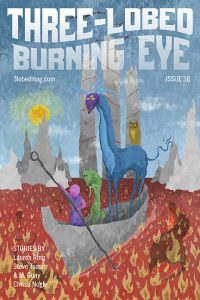 Three-Lobed Burning Eye, <www.3lobedmag.com>, edited by Andrew S. Fuller, published 12 original stories in three online issues and a print anthology. Fuller said, “It was a good year, with some interest in the magazine. 3200+ submissions read, positive reviews in Locus and Tor.com and other places. More subscribers using Patreon, though we still need more support to increase our author pay, and expand. Also in December we published the latest print collection 3LBE Volume IX which reprints Issues 33-37 with new illustrations. Favorite stories: ‘Exquisite Corpses’ by A.M. Guay, ‘One Eye Opened in That Other Place’ by Christi Nogle, ‘In Her Dreams, the River’ by A.Y. Lu. Look for more fiction from these writers, along with Nogle’s two new collections from Flame Tree Press.” They had 1,500 visitors/month, 250 ebook purchases, and 400 newsletter subscribers. $100/short story, $30/flash fiction. [Semiprozine]
Three-Lobed Burning Eye, <www.3lobedmag.com>, edited by Andrew S. Fuller, published 12 original stories in three online issues and a print anthology. Fuller said, “It was a good year, with some interest in the magazine. 3200+ submissions read, positive reviews in Locus and Tor.com and other places. More subscribers using Patreon, though we still need more support to increase our author pay, and expand. Also in December we published the latest print collection 3LBE Volume IX which reprints Issues 33-37 with new illustrations. Favorite stories: ‘Exquisite Corpses’ by A.M. Guay, ‘One Eye Opened in That Other Place’ by Christi Nogle, ‘In Her Dreams, the River’ by A.Y. Lu. Look for more fiction from these writers, along with Nogle’s two new collections from Flame Tree Press.” They had 1,500 visitors/month, 250 ebook purchases, and 400 newsletter subscribers. $100/short story, $30/flash fiction. [Semiprozine]
There were two issues of Alien Dimensions, <aliendimensions.com>, one regular at 247 pages and one “bumper” or double issue at 386 pages, perfect bound, 15 x 23 cm, with glossy color covers and b&w interiors, including 37 original short stories. The magazine was available in ebook and POD. Editor was Neil A. Hogan. The upcoming submissions theme will be “Mars Colonization 2033,” with submissions open through March 2024. Regular print issue cover price was $13.95, up from $12.95, ebook $6.99, up from $4.99. Double issue was $17.20, ebook $8.95. Ebooks were available free with subscription to Kindle Unlimited. Pay rate was $20 per story. [Semiprozine]
Daily Science Fiction, <dailysciencefiction.com>, co-published and co-edited by Michele-Lee Barasso & Jonathan Laden, published a final story online and by email delivery in January, after announcing their permanent hiatus. Pay was $.08/word up to 1,500 words. [Semiprozine]
There was one issue of Planet Scumm, <www.planetscumm.space> with seven original and two reprint stories, electronically and in print, 14.5 x 21 cm with matte color cover and b&w interior, 120 pages. Editor-in-chief was Sean Clancy. Managing editor Tyler Berd and staff editor Anna Catalano said, “We’d love to see more diverse authors, more international authors, stories that buck convention, ways of storytelling that feel fresh, and stories that are different from what we’ve already published.” Cover price was $14.00/print, $10.00/ebook. Pay rate was $0.06/word. [Semiprozine]
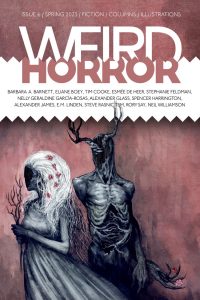 We saw two issues of Weird Horror from Undertow Publications, <www.weirdhorrormagazine.com>, available in print and digital editions and free online, with 24 original stories, 15 x 23 cm with semigloss color covers and b&w interiors. Editor Michael Kelly said, “We publish stuff that splits the genre/literary divide. And those hard to classify stories appear to please our readers. We would, as always, welcome more submissions from the more marginalized and historically disadvantaged community of writers. And newer writers.” Each issue sells about 750 copies combined print and digital (about 65% print) and the website averages 1,500 unique visitors per month, up from 1,200. Pay rate was $0.015/word with a $25 minimum. [Semiprozine]
We saw two issues of Weird Horror from Undertow Publications, <www.weirdhorrormagazine.com>, available in print and digital editions and free online, with 24 original stories, 15 x 23 cm with semigloss color covers and b&w interiors. Editor Michael Kelly said, “We publish stuff that splits the genre/literary divide. And those hard to classify stories appear to please our readers. We would, as always, welcome more submissions from the more marginalized and historically disadvantaged community of writers. And newer writers.” Each issue sells about 750 copies combined print and digital (about 65% print) and the website averages 1,500 unique visitors per month, up from 1,200. Pay rate was $0.015/word with a $25 minimum. [Semiprozine]
In poetry, we received three issues of Dreams & Nightmares, <www.dreamsandnightmaresmagazine.com> with 69 original poems, priced at $5.00 (less for subscribers) for print, or $1.00 per PDF edition. Print run was 140, with a subscriber base of 83, plus 25 digital subscribers. Editor was David C. Kopaska-Merkel, who said “Moving from b&w covers to full-color covers. Readership has been stable; it’s a challenge to get enough good submissions. I’d like to see more poems that will fit on a single page.” Pay rate was $15/poem, up from $12. [Semiprozine]
Star*Line, <www.sfpoetry.com/starline.html>, the journal of the Science Fiction and Fantasy Poetry Association, produced four issues priced at $5.00, with 360 original poems, available in print and PDF. There were 286 digital subscribers and 145 print subscribers, with an average print run of 270 copies per issue. Pay rate was $.04/word, minimum $4.00. Editor Jean-Paul L. Garnier said, “I would like to see more works in translation. Editor’s Choice poems for each issue can be read on the website.” The SFPA also published 76 poems in Eye to the Telescope, a quarterly online speculative poetry journal with a different theme and editor each issue, <www.eyetothetelescope.com>. [Semiprozine]
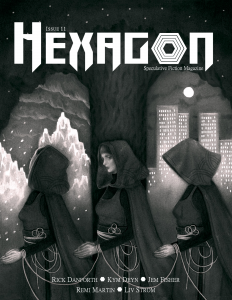 Hexagon, <https://hexagonmagazine.ca/>, edited by JW Stebner, published 19 original stories and one original poem in four online issues, plus 15 stories in their Myriad zine series. “Light fantasy stories and climate fiction got great responses this year. Our incredibly popular Issue 13 was responsible for nearly a third of our downloads this year.” Pay was C$.01/word. 1,500 uniques, with 4,870 issue downloads and 120 subscriptions via Patreon. [Semiprozine]
Hexagon, <https://hexagonmagazine.ca/>, edited by JW Stebner, published 19 original stories and one original poem in four online issues, plus 15 stories in their Myriad zine series. “Light fantasy stories and climate fiction got great responses this year. Our incredibly popular Issue 13 was responsible for nearly a third of our downloads this year.” Pay was C$.01/word. 1,500 uniques, with 4,870 issue downloads and 120 subscriptions via Patreon. [Semiprozine]
Solarpunk, <solarpunkmagazine.com>, edited by Brianna Castagnozzi, Justine Norton-Kertson, et al, published 18 original stories in six scheduled online issues, plus 16 micro fiction stories, poetry, and non-fiction. Norton-Kertson said, “We couldn’t be more grateful for our community of readers. We’re going to keep rolling along in 2024. The one thing that will be a bit different is that we’re going to be working harder to steer readers toward our Patreon as our preferred platform, where they can subscribe to our regular six annual issues and also get additional monthly bonus content.” Pay for short fiction was $.08/word. Average unique visitors was 2,750, with 6,568 hits per month and 378 subscriptions. [Semiprozine]
Factor Four <factorfourmag.com>, edited by Richard Flores IV, published 48 original stories in 12 online issues. Flores said, “We enjoy most stories related to fantasy and science fiction genres. Character driven stories do best for us.” Pay was $.11/word. Average unique visitors was 1,020/month, with 2,884 average website hits/month. [Semiprozine]
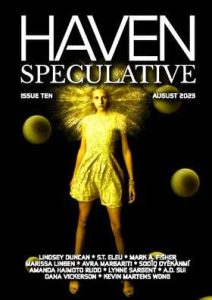 Haven Speculative, <www.havenspec.com/>, edited by Leon Perniciaro, published 28 original stories plus poetry in five digital issues. “We raised over ten thousand dollars through Kickstarter, almost all of which is going towards content. We will also be launching a short fiction review column, author interviews, and more…. With our increased author pay, we plan on getting a ton more submissions and being able to publish even more absolutely amazing fiction and poetry this year. The story that got the most buzz in 2023 was Valo Wing’s ‘To Kneel at the Altar of Your Bones’, published in our March 2023 issue, and it’s so delightfully strange that it’s not hard to see why.” Pay is $.08/word for original fiction. They have 115 subscriptions. [Semiprozine]
Haven Speculative, <www.havenspec.com/>, edited by Leon Perniciaro, published 28 original stories plus poetry in five digital issues. “We raised over ten thousand dollars through Kickstarter, almost all of which is going towards content. We will also be launching a short fiction review column, author interviews, and more…. With our increased author pay, we plan on getting a ton more submissions and being able to publish even more absolutely amazing fiction and poetry this year. The story that got the most buzz in 2023 was Valo Wing’s ‘To Kneel at the Altar of Your Bones’, published in our March 2023 issue, and it’s so delightfully strange that it’s not hard to see why.” Pay is $.08/word for original fiction. They have 115 subscriptions. [Semiprozine]
In print, we also saw two issues of genre-literary crossover journal Conjunctions, with some content of genre interest. In sword and sorcery, we saw two issues of New Edge and one issue each of Tales from the Magician’s Skull and new publication Old Moon. We also saw one special ghost-themed issue of Room. There were four issues of Boundary Shock Quarterly and one issue each of Vastarien and Weirdbook available online, though we did not see these magazines. There were no new issues of Anathema (due to editorial changeover), Fiction River, Neo-Opsis, Infinite Worlds/Infinite Horrors, Terraform, for the SFWA Bulletin this year, and Mithila, Smith’s Monthly, Speculative City were on hiatus.
PODCASTS /AUDIO FICTION
Escape Artists became a registered 501(c)(3) nonprofit on January 1, 2023, under the leadership of Marguerite Kenner and Alasdair Stuart. Escape Pod and PodCastle were finalists for the Best Semiprozine Hugo Award. All four markets pay $0.08/word for original fiction, $100/story for reprints, and $20/flash fiction reprint.
There were 52 episodes of Escape Pod, <www.escapepod.org>, co-edited by Mur Lafferty and Valerie Valdes, with 46 SF stories, including 13 originals. PodCastle, <www.podcastle.org>, edited and hosted by Rachel Swirsky, produced 52 episodes with 55 fantasy stories, including 20 originals. PseudoPod, <www.pseudopod.org>, edited by Shawn Garrett and Alex Hofelich, produced 52 episodes with 54 horror stories, including 15 original stories. Cast of Wonders <www.castofwonders.org>, edited by Katherine Inskip, published 47 episodes with 40 stories, 23 of them originals. CatsCast, publishing “speculative cat stories monthly” to Patreon and edited by Laura Pearlman, ran 11 cat-themed stories, some of them exclusive for patrons. [Semiprozine]
StarShipSofa, <www.starshipsofa.com>, produced and hosted by Tony C. Smith, published 23 episodes with 20 stories, four of which were originals. Pay was $50/story. [Semiprozine]
Tales to Terrify, <talestoterrify.com>, owned and hosted by Drew Sebesteny and edited by Seth Williams, published 52 regular and two bonus episodes. Sebesteny said, “Our annual flash fiction contest continues to be a hit among listeners and authors alike, as does our yearly round-up of Stoker Award nominated stories. We’re big suckers for gothic haunted houses, creepy cryptids and space horror, so we’d love to see more of all of those!” Average unique listeners per month was 15,000, with 4,800. Pay was $0.01 USD/word for stories over 2,000 words, and will increase to $0.02 in 2024. [Semiprozine]
World Fantasy and Ignyte Award winner Nightlight, <nightlightpod.com>, created and produced by Tonia Ransom, published 28 episodes with 21 stories, paying a flat $200 for original short fiction, $75 for original flash fiction, and $50 for reprints. Nightlight featured 21 stories, mostly originals, “creepy stories with full audio production written by Black writers and performed by Black actors.” Featured authors included Ozzie M. Gartrell and L. Marie Wood. [Semiprozine]
Kevin Frost’s Gallery of Curiosities, <gallerycurious.com> published two episodes, paying $.05/word for fiction exploring “the curious and often dark corners of retropunk fiction.” The 2023-2024 season is expected to feature 15 episodes. [Semiprozine]
Drabblecast, <www.drabblecast.org>, “off-beat, funny, eclecticism in science fiction, fantasy, and horror,” hosted, produced, and narrated by Norm Sherman, published 19 episodes. Pay was $.06/word for original fiction and $.03/word for reprint fiction. Sherman reported an average of 44,000 downloads per month. [Semiprozine]
Simultaneous Times, <podomatic.com/podcasts/spacecowboybooks>, published 12 episodes, paying $.02/word. “We hope to produce more collaboration episodes with other SF magazines… We worked with many international authors, and produced our first bilingual episode, we would love to continue bringing in voices from all over the globe.” Average downloads in a year were 11,000. [Semiprozine]
While LeVar Burton Reads <www.levarburtonpodcast.com> is not a self-described speculative fiction venue, Burton happens to read mostly speculative fiction. In 27 episodes Burton read SF classics by Kurt Vonnegut, work by SF newcomers such as Allison King, fiction from beloved SF icons like Peter S. Beagle, stories from up-and-comers like Tobi Ogundiran, material from multi-award winners like Rebecca Roanhorse and Sarah Pinsker, and more. [Professional]
FANCASTS
Michelle Graham & Giles Hash cohosted Beyond the Trope, <beyondthetrope.com>, publishing 50 episodes. “In 2023, we had a chance to talk to some amazing authors, including Jim Butcher, Mur Lafferty, Rebecca Yarros, and Garth Nix. Due to changes in our lives, the biggest change we’re making in 2024 is to shut down the show. We have scheduled episodes through February 27, 2024, which will bring us to our 10th anniversary, and then we’re going to move on to new projects.” Average downloads per month were 1,124. [Fancast]
Functional Nerds, <www.functionalnerds.com>, posted 41 of 48 planned episodes focusing on SF/F media. Patrick Hester said, “The no-show trend among publicists was unwelcome, to say the least. Our listeners began asking if we were cursed (and so did we). Unfortunately, this interfered with our plans for episode 600. But we were still able to get some special listener favorites like Kevin Hearne, Mur Lafferty, Stephen Aryan and Temi Oh for the latter half of the year.” Episodes averaged between 1,900 and 2,200 downloads each month. [Fancast]
The Coode Street Podcast, <jonathan-strahan.podbean.com>, with hosts Jonathan Strahan & Gary K. Wolfe, published 20 episodes out of a planned 26. The Coode Street Podcast was a finalist for the Hugo Award for Best Fancast. [Fancast]
Geek’s Guide to the Galaxy, <geeksguideshow.com>, hosted by David Barr Kirtley and produced by John Joseph Adams, had 25 episodes. Kirtley said: “The biweekly schedule will probably continue for the foreseeable future, but I may start putting out a third episode per month here and there…. This year’s episodes had a heavier focus on gaming, with lots of discussion of Dungeons & Dragons, as well as interviews with legendary game designers John Romero and Ian Livingstone. Our panel discussions of old movies featuring Matthew Kressel, Andrea Kail, and Tom Gerencer continued to be popular.” Kirtley estimates 15,000 downloads per episode. [Related Work]
Our Opinions Are Correct, <www.our-opinionsarecorrect.com>, hosted by Charlie Jane Anders & Annalee Newitz, produced 22 episodes of deep dives into SF books, movies, television, and comics. “We grew our podcast really nicely this year, passing a million total downloads. We’ve been so happy to be part of a robust conversation in the podcastsphere about science, futurism, and how the stories we tell shape us.” Average downloads per episode were 6,000. [Fancast]
The Skiffy and Fanty Show, <skiffyandfanty.com>, with hosts Shaun Duke & Brandon O’Brien, plus a variety of guests. They published 31 episodes plus four more on Patreon. Interviews included Eden Royce and Wole Talabi. Duke reported “somewhere between 500 and 1000 listeners.” [Fancast]
Writing Excuses, <www.writingexcuses.com>, produced 53 educational episodes by writers for writers. Hosted by “core cast” Mary Robinette Kowal, Erin Roberts, DongWon Song, Howard Tayler, and Dan Wells. “We brought on a producer and held three different recording retreats in Utah, Alaska, and Texas. Our writing retreats were well attended, and we loved meeting our new listeners!” They saw 72,000 listeners per month. [Related Work]
Worldbuilding for Masochists, <worldbuildingformasochists.podbean.com>, hosted by Natania Barron, Cass Morris & Marshall Ryan Maresca, produced 26 episodes (Barron replaced prior host Rowenna Miller) and was a finalist for the Hugo Award for Best Fancast. Guests included G.R. Macallister, Darcie Little Badger, Suyi Davies Okungbowa, Aparna Verma, S.L. Huang, and Seanan McGuire. [Fancast]
Breaking the Glass Slipper, <www.breakingtheglassslipper.com>, an “intersectional feminist podcast” produced 23 episodes. Hosts are Charlotte Bond, Lucy Hounsom & Megan Leigh. This year’s episodes had a shorter playtime, averaging around 40 minutes. Guests included C.L. Clark, Cassandra Khaw, Andrea Stewart, Jane Yolen, and more. [Fancast]
Hugo, Girl!, <hugogirlpodcast.com>, in which “Three space feminists read, dissect, and rant at Hugo Award-winning pieces of fiction,” planned 12 episodes and produced 14, including two specials: an April Fools Day prank announcement, and a cookbook review with guest Ann Haris. The show is hosted by Lori Anderson, Amy Salley, and Haley Zapal, edited and produced by Kevin Anderson. Lori Anderson said, “Our episode on The Yiddish Policemen’s Union got the biggest response. We received lots of thoughtful comments on social media, as well as several emails. We really enjoy hearing our listeners’ perspectives and sharing their comments on future episodes, so we look forward to more of that in 2024.” Hugo Girl won the Hugo Award for Best Fancast, and recused itself from future nomination. Average downloads per month were 1,400, with 109 average visitors and 328 pageviews per month. [Fancast]
Fangirl Happy Hour, <www.fangirlhappyhour.com>, “on the intersections of fandom, literature, and culture,” produced one episode in 2023, a discussion of anticipated books. Hosts are Ana & Renay, co-editors of The Book Smugglers and Lady Business, respectively. [Fancast]
Octothorpe, <octothorpe.podbean.com>, “A podcast about science fiction and SF fandom from John Coxon, Alison Scott, and Liz Batty,” produced 26 episodes. Topics varied, including discussions of conventions, books, and more. Their conversations have earned them several Hugo nominations, a BSFA nomination, and an ESFS nomination. [Fancast]
Kalanadi, <www.youtube.com/user/kalanadi>, is a Booktube channel run by Rachel, “a private, introverted person” whose “favorite genre is science fiction, closely followed by fantasy.” Kalanadi posted 13 videos in 2023, plus five more “Stitch & Bitch” live sessions, which includes special “Hugo Awards Reactions” episodes. Kalanadi has received two Hugo Award nominations, including a 2023 spot, and won a Parsec award in 2018 for Best Speculative Fiction Fan or News Podcast. [Fancast]
CRITICAL MAGAZINES
There were three issues of scholarly journal Extrapolation, from Liverpool University Press, totaling 807 pages, including a special issue on “Sf Post Humanism, and new Materialism, Tensions and Entanglement” edited by John Landreville & Tony M. Vinci, with essays on many topics from “Toward a Daoist Futurity” to “Posthumanist Sentimentality”. Andrew M. Butler was managing editor. Print and PDF available at <www.liverpooluniversitypress.co.uk/journal/extr>. [Related Work]
There were three issues of academic journal Foundation, <www.sf-foundation.org/>. Editor Paul March-Russell said, “The highlight for me personally was no. 146 – our issue based upon 2022’s SFF conference on women in science fiction and fantasy – and the opportunity to publish Nicola Griffith, Una McCormack, Kate Macdonald and Nisi Shawl in conversation about Vonda McIntyre, as well as Harry Josephine Giles and Roz Kaveney in commemoration of Rachel Pollack.” Print runs were 270 copies, matching the SFF membership base. [Related Work]
Three issues of scholarly journal Science Fiction Studies, <www.depauw.edu/sfs>, were published by non-profit SF-TH Inc. at DePauw University, totaling 526 pages. The magazine was available in print and digital through Project MUSE, with back issue access through JSTOR. Arthur B. Evans, SF-TH Inc. president, was the managing editor. Subscriber base was about 600, with the print/electronic subscription ratio averaging 40%/60%. [Related Work]
There were three issues of Australian SF Commentary, for a total of 292 pages, with reviews, essays, articles, and tributes. Articles included a Chicon 8 report in issue 112, ‘Cosy’ SF, and Climate Fiction in issue 113, and AI art in 114. Editor and publisher was Bruce Gillespie, who said, “The January 2024 issue will be the 55th Anniversary Issue. The first issue was January 1969.” Free PDFs were available through <www.efanzines.com/SFC>. [Related Work]
SFRevu <www.sfrevu.com> published 12 monthly issues, free online, with 45 book reviews, 30 short fiction reviews, one manga/graphic novel review, SF/F news, and columns. Senior editor was Gayle Surrette. [Semiprozine]
There were two issues of Vector, <vector-bsfa.com>, the critical journal of the British Science Fiction Association, edited by Phoenix Alexander, with articles on SFF in books, games, television, music, and film. Alexander said: “Issue 297 – the largest issue to date – was guest edited by Stephen Oram, and marked a collaboration between the BSFA and the Institute for Development Studies. Issue 298 was guest-edited by myself and Stewart Baker, and centered on the theme of libraries, archives, and the future of information.” [Related Work]
In 2023, there were two issues of Focus, the BSFA’s magazine for writers, edited by Dev Agarwal; three issues of the digital reviews ‘zine BSFA Review, edited by Sue Oke; and one volume of the digital fiction anthology Fission, edited by Eugen M. Bacon & Gene Rowe. Next year, the BSFA plans to publish an issue of Vector on the theme of speculative Modernism, one issue of Fission (ed. Eugen M. Bacon and Gene Rowe); and 3-4 issues of The BSFA Review (ed. Sue Oke). BSFA now also offers digital-only membership. [Related Work/Fanzine]
There were three issues of the Journal of the Fantastic in the Arts, <www.fantastic-arts.org/jfa>; editor was Jude Wright, with over 800 total pages of critical essays and reviews on a variety of topics ranging from “Enabling Artistry” to “Genre Infrastructure as Speculative Method in Latin America”. [Professional]
QUALITY
Our gauge for quality is based on our short fiction Recommended Read list; see chart. We recommended 111 pieces of short fiction from 2023, six fewer than last year’s 117. Recommended stories appeared in 27 magazines or online venues, down from last year’s 29. Anthologies had the most recommended stories with 14, down substantially from last year’s 23. New Suns 2 had seven stories, The Book of Witches had four, Out There Screaming had two, and Communications Breakdown had one. Collections had three recommended stories, the same number as last year. For the third year, Uncanny led the magazines/fiction sites, publishing 11 stories in 2023, followed by Clarkesworld with ten, Tor.com with nine, The Sunday Morning Transport with seven, and Asimov’s with six. Beneath Ceaseless Skies and Strange Horizons tied with five stories each. The remaining 21 magazines had four or fewer recommended titles.
CONCLUSION
It’s so hard to read about the editor fatigue, lack of funding, rising costs, and other struggles that the magazines face these days. There’s also so much enthusiasm and desire to make it happen, such love for fiction, and genuine hard work going into the field, we are still flush with stories to read. And some venues are making it work, whether through a lean structure, or Patreon support, or Kickstarters. Print remains an aspirational goal for many, with the cost of paper and shipping always going up.
A few new print venues have emerged or come to our attention including Wyldblood and Heartlines, even while venerable outlets like Black Static are closing their doors forever. The most persistent new problem we heard about this year was a deluge of AI submissions hitting inboxes and making it hard to sort signal from noise. Some editors embraced or grappled with AI in special AI-themed issues or features, but for the most part the mood was one of resistance, with many issuing anti-AI statements affirming the value of human creators. So far in the field AI seems to be a suitable subject for science fiction, but not a suitable author of our futures.
As we annually say: Show the magazines you read that you value their work: subscribe, donate, join their Patreons, advertise on their websites, talk about them on social media. They need it.
–Francesca Myman, Arley Sorg, Liza Trombi, Laurel Amberdine, Simon Herz, with assistance from Bob Blough
This summary and more like it in the February 2024 issue of Locus.
 While you are here, please take a moment to support Locus with a one-time or recurring donation. We rely on reader donations to keep the magazine and site going, and would like to keep the site paywall free, but WE NEED YOUR FINANCIAL SUPPORT to continue quality coverage of the science fiction and fantasy field.
While you are here, please take a moment to support Locus with a one-time or recurring donation. We rely on reader donations to keep the magazine and site going, and would like to keep the site paywall free, but WE NEED YOUR FINANCIAL SUPPORT to continue quality coverage of the science fiction and fantasy field.
©Locus Magazine. Copyrighted material may not be republished without permission of LSFF.






